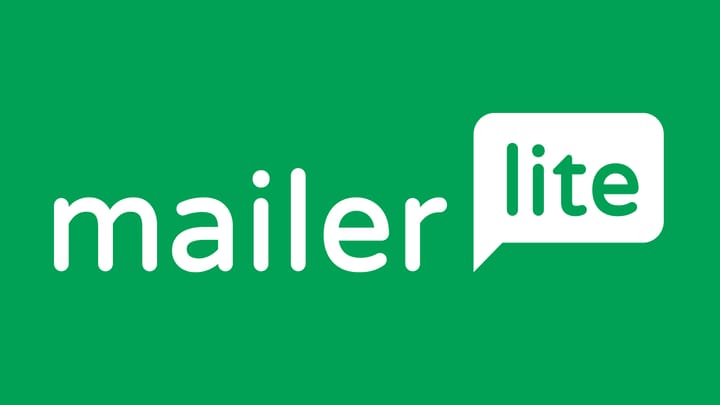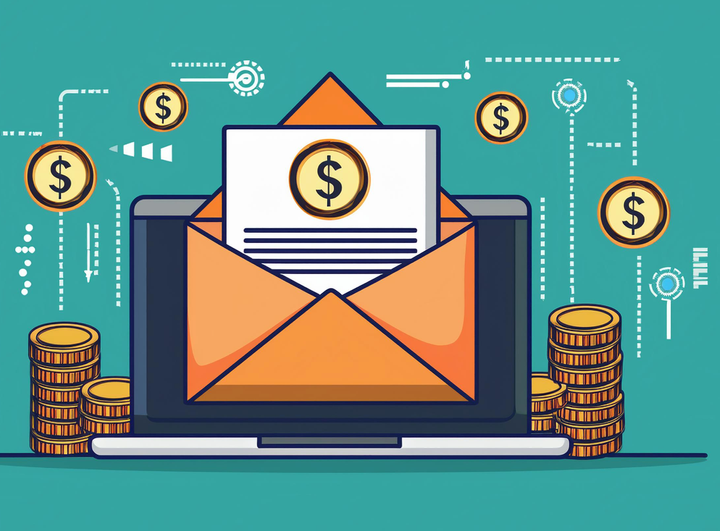Top 31 Free Email Providers List To Watch Out For This 2025
Looking for the best free email providers?if you've found yourself like other business owners or even marketers on a quest for a new email service, you're not alone. Many are in search of providers that better align with their evolving needs.

Looking for the best free email providers?
Email has come a long way since Ray Tomlinson sent the first electronic message in 1971.
Today, it is an essential part of our daily routine, intricately woven into both our personal and professional lives, with more than 300 billion emails exchanged every day.
Now, if you've found yourself like other business owners or even marketers on a quest for a new email service, you're not alone. Many are in search of providers that better align with their evolving needs.
Before you dive into comparing inbox features, make sure your contact list is clean and up to date by running it through an email finder; starting with verified addresses will help whichever service you choose deliver higher engagement and fewer bounces.
Selecting the right email service is crucial for efficient communication, whether for work or personal purposes.
It will also become harder as these email services aim to boost organisation and accessibility, with many boasting advanced security to combat spam and phishing, while others excel at their simple, intuitive interfaces. Integration with productivity tools has made them full-fledged communication hubs, streamlining personal and professional connectivity.
So, understanding your requirements is essential, as each service varies in terms of features, design, storage, and application integration.
In this article, we're here to guide you through this process by presenting a comprehensive list of the best free email providers this coming 2025.
What Is an Email Service Provider?
Email service providers play an important role in digital communication by facilitating the sending and receiving of emails.
There are primarily three types of email service providers: general email providers, SMTP service providers and email marketing service providers.
General email providers cater to the everyday user who requires a free and straightforward email tool, focusing on accessibility and ease of use.
Meanwhile, businesses typically favour paid email marketing service providers due to their advanced capabilities, such as custom domains, marketing automation, and comprehensive analytics, which are vital for fostering business growth and enhancing customer engagement.
Email platforms can further be divided into webmail and email clients. Webmail, such as Gmail and Yahoo! Mail, functions online without the need for software downloads, providing seamless access via the cloud.
In contrast, email clients like Microsoft Outlook necessitate installing software onto a computer, offering robust features to manage emails more intensively. Each choice caters to specific user preferences and requirements, thereby serving distinct roles in the digital communication landscape.
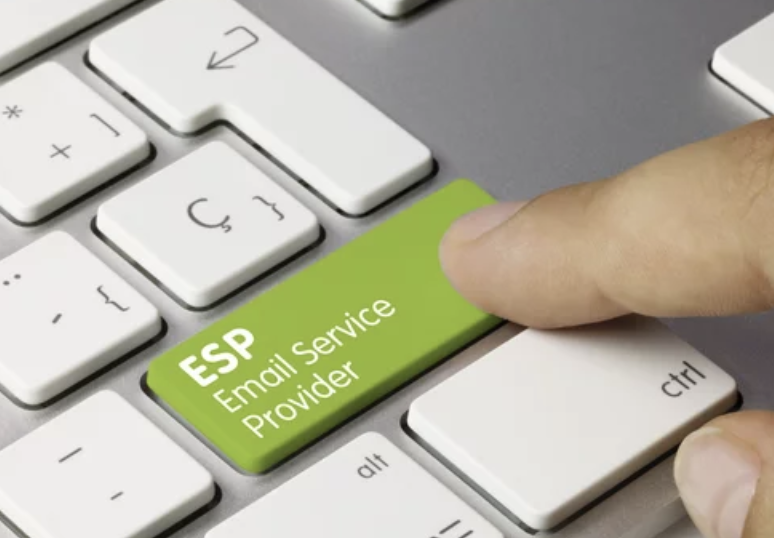
30 Email Service Providers You Can Use for Free in 2025
When considering free email service providers for the year 2025, several options stand out due to their features, reliability, and ease of use.
Below is a list of some popular providers by category that offer free plans:
General Service Providers:
1. Gmail
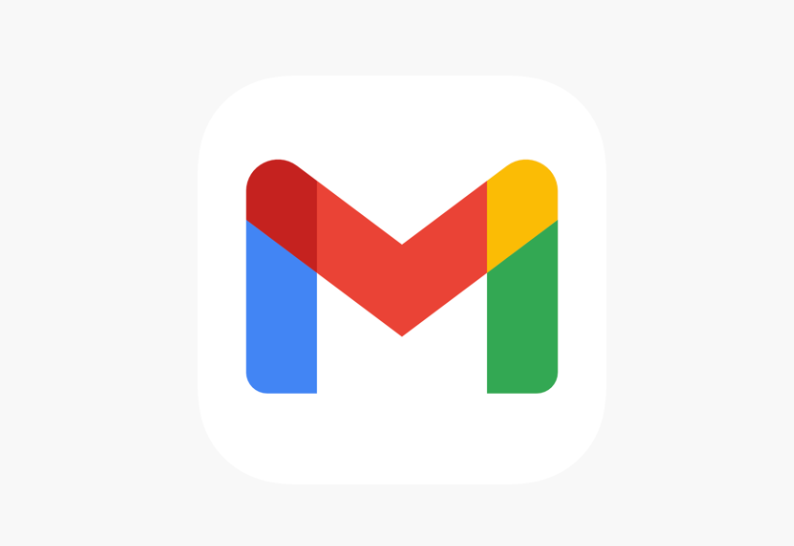
Gmail, operated by Google, ranks as one of the top web clients for email thanks to its straightforward, no-cost usage.
In 2021, it accounted for 36.5% of global email opens. Supporting 105 languages, Gmail also provides paid business plans, allowing for various storage, support, and feature options.
Compatible with multiple devices, including Windows and Apple computers, iOS and Android devices, ChromeOS, and Linux-based systems, Gmail excels in versatility.
Notable features include 15 GB of free storage, inbox filtering, the ability to unsend emails, and protection against spam.
For businesses accustomed to Google’s product suite, Gmail is a reliable choice with promptly addressed issues, though its business plans may be costly.
2. Outlook
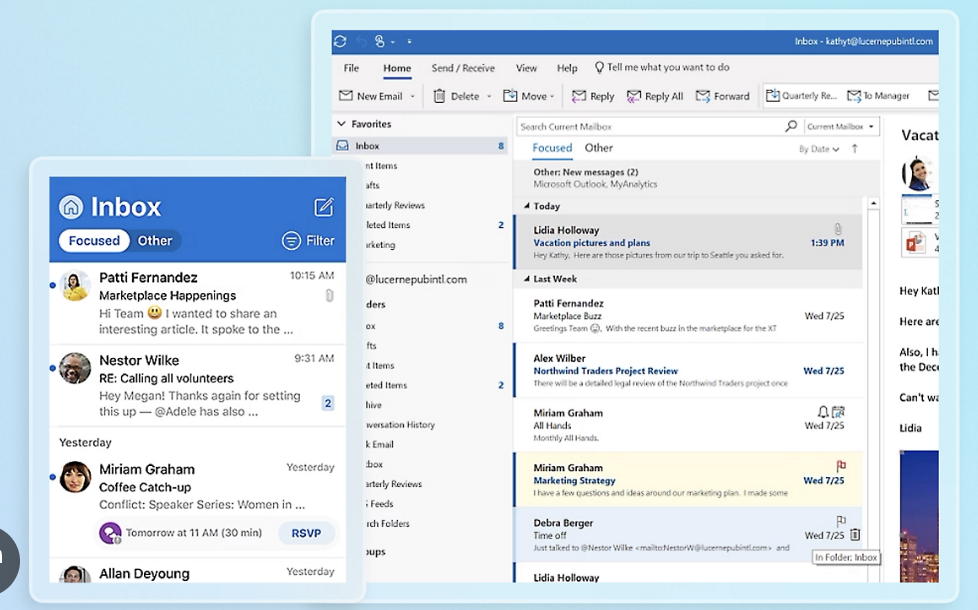
Outlook, originally launched as Hotmail in 1996, is Microsoft’s feature-rich web-based email service that goes beyond basic email management.
Over the years, Outlook.com has evolved into a powerhouse of productivity, offering not just webmail but also integrated tools like contacts, calendars, tasks, and more.
A significant advantage of Outlook.com is its seamless integration with Microsoft’s suite of tools, such as Skype, OneDrive, and Office Online. By signing up for an Outlook.com account, users gain access to these services, making it ideal for individuals who need a comprehensive, connected work environment. Unlike Gmail, Outlook’s email storage doesn’t eat into OneDrive’s cloud storage, giving users more room to manage both their emails and files.
With over 15 GB of storage space for emails and free OneDrive integration for larger files, Outlook offers plenty of room for both personal and professional use. It’s not just an email service but a productivity hub designed to work harmoniously with Microsoft’s ecosystem.
3. Neo
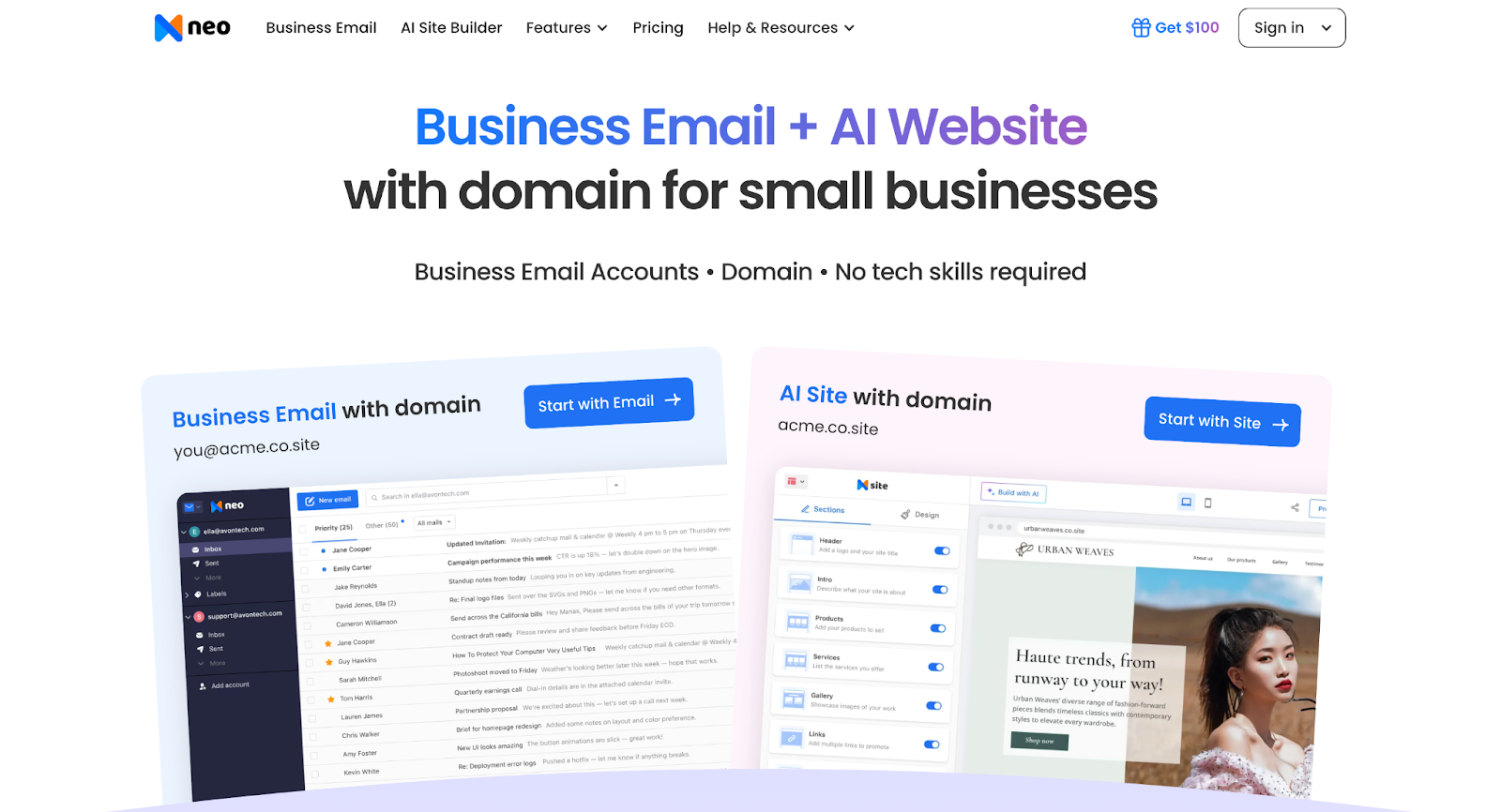
Neo is a powerful business email and growth platform designed for small businesses, freelancers, and service providers who want to look professional from day one. It gives you everything you need in one place—custom business email addresses, a free domain, a one-page website, and essential tools like email marketing, appointment scheduling, AI-assisted email writing, open-rate tracking, and follow-up reminders. With up to 100GB of storage per mailbox, mobile and web apps, signature creation, and contact groups, Neo equips you with all the tools to communicate confidently and nurture customer relationships.
Starting at just $1.99/month (billed annually), Neo replaces multiple expensive subscriptions with a single, affordable solution. While it doesn’t aim to match the heavy collaboration features of enterprise suites, its strengths—AI-powered communication tools, built-in marketing, easy setup, and a free domain—make it the perfect choice for small teams that want simplicity, credibility, and the ability to grow fast.
4. ProtonMail
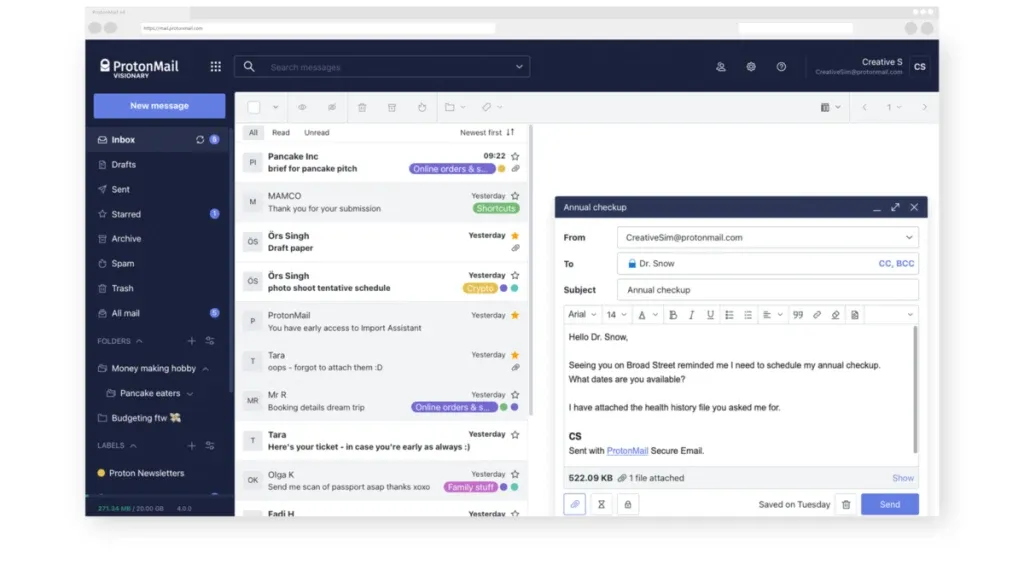
ProtonMail stands out from email giants like Gmail and Outlook due to its robust security features, making it a prime choice for privacy-conscious users.
Unlike conventional email providers, ProtonMail delivers end-to-end encryption, guaranteeing complete confidentiality for every email you transmit.
Despite its powerful security and ease of use, ProtonMail hasn't reached the ubiquity of Gmail or Outlook; however, it's particularly well-suited for freelancers, self-employed individuals, and both small and large businesses.
Users can activate an anonymous account without disclosing personal details, benefiting from an intuitive interface available across any device, which enhances productivity.
Free users receive 500 MB of storage, one email address, the capability to send up to 150 messages daily, and up to three folders or labels with limited support. Paid plans, starting at about $9.99 per month, offer expanded features like multiple addresses, custom domains, unlimited labels, filters, priority support, and the ProtonMail Bridge for integration with clients like Microsoft Outlook and Mozilla Thunderbird.
5. Yahoo Mail

Yahoo Mail stands out as an exceptional email service, particularly suitable for users who frequently send and receive numerous attachments.
With over 1 TB of free storage, you can conveniently archive emails, photos, and files in one location, simplifying the process of finding what you need. The platform’s layout, with its intuitive tabs, makes navigating through documents, photos, and videos simple and fast.
One of the cool things about Yahoo Mail is the ability to customise your inbox with background themes, plus it integrates with social media, adding a fun and organised touch to your experience. For businesses, Yahoo’s strong security features make it a trustworthy choice for handling lots of attachments without worry.
Moreover, Yahoo Mail's customisable mobile inbox, combined with generous storage and seamless subscription management, offers an unmatched email experience. The all-in-one inbox feature further simplifies life by integrating multiple email accounts like Gmail and Outlook into one convenient interface.
With its focus on substantial storage and personalisation options, Yahoo Mail is an adaptable and versatile choice, accommodating a wide variety of user needs.
6. Mail.com
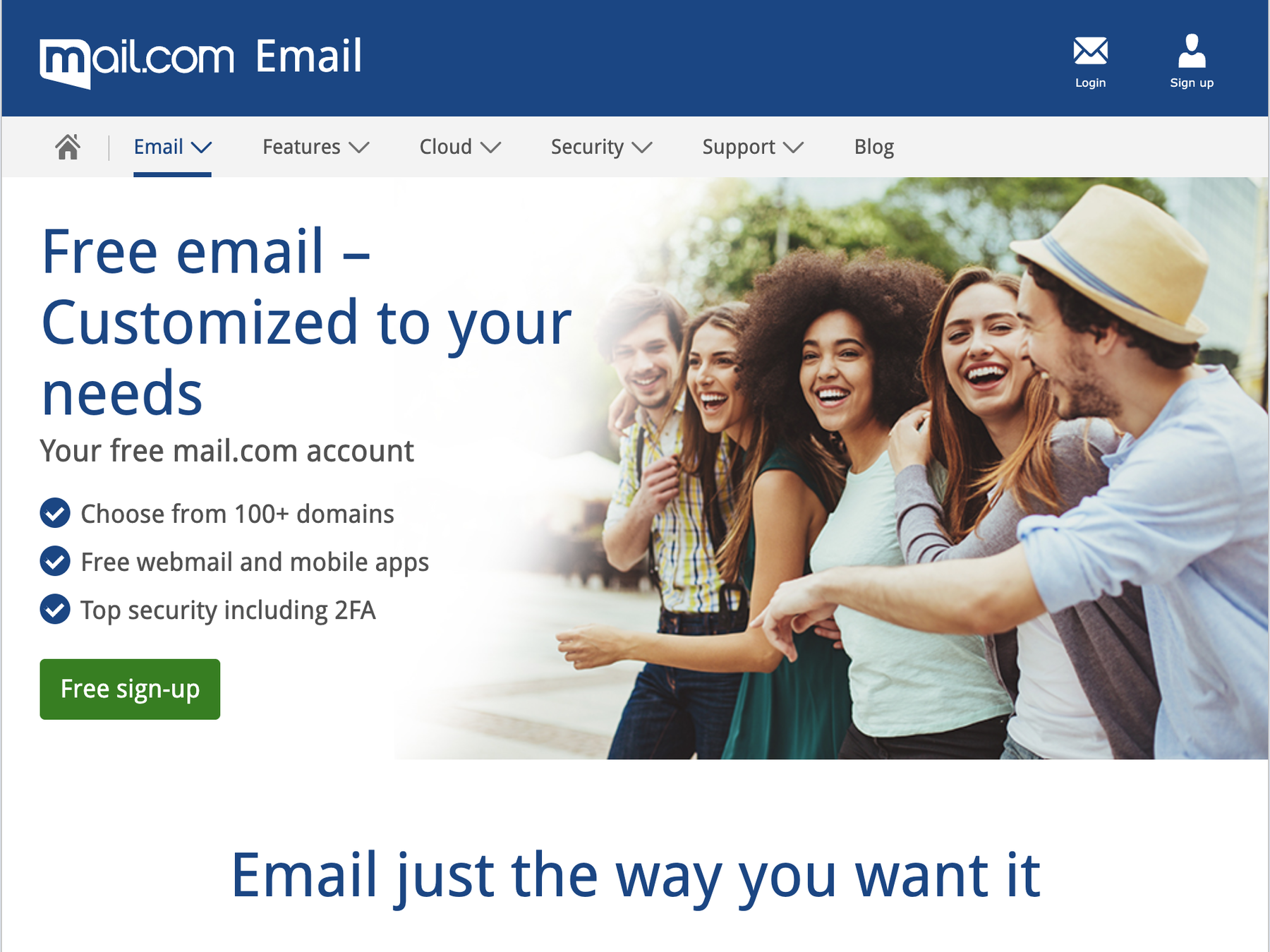
Although Mail.com may not have the same name recognition as Gmail or Outlook, its unique features make it a great choice for both personal and professional email users.
One of its standout perks is the ability to choose from over 200 domain extensions, perfect for businesses or anyone looking for a more personalised email address.
Mail.com is free, but for those who want more, the premium version removes ads, increases storage, and unlocks additional services. It’s also equipped with helpful tools like an online office for document creation, an organiser to sync calendars and set reminders, and MailCheck for real-time notifications across multiple accounts. Plus, you can create up to 10 alias email addresses under one account, with up to 65GB of free storage. Filters and templates allow you to manage emails just the way you like.
Security-wise, Mail.com delivers with antivirus protection, spam filters, and the option for two-factor authentication (2FA), keeping your inbox safe. Whether you're freelancing, self-employed, or running a small to midsized business, Mail.com gives you the freedom to express your brand with creative domain choices—like "@youraccountant.com" or "@partner.com"—so your email address can reflect your personal or professional vibe.
7. GMX
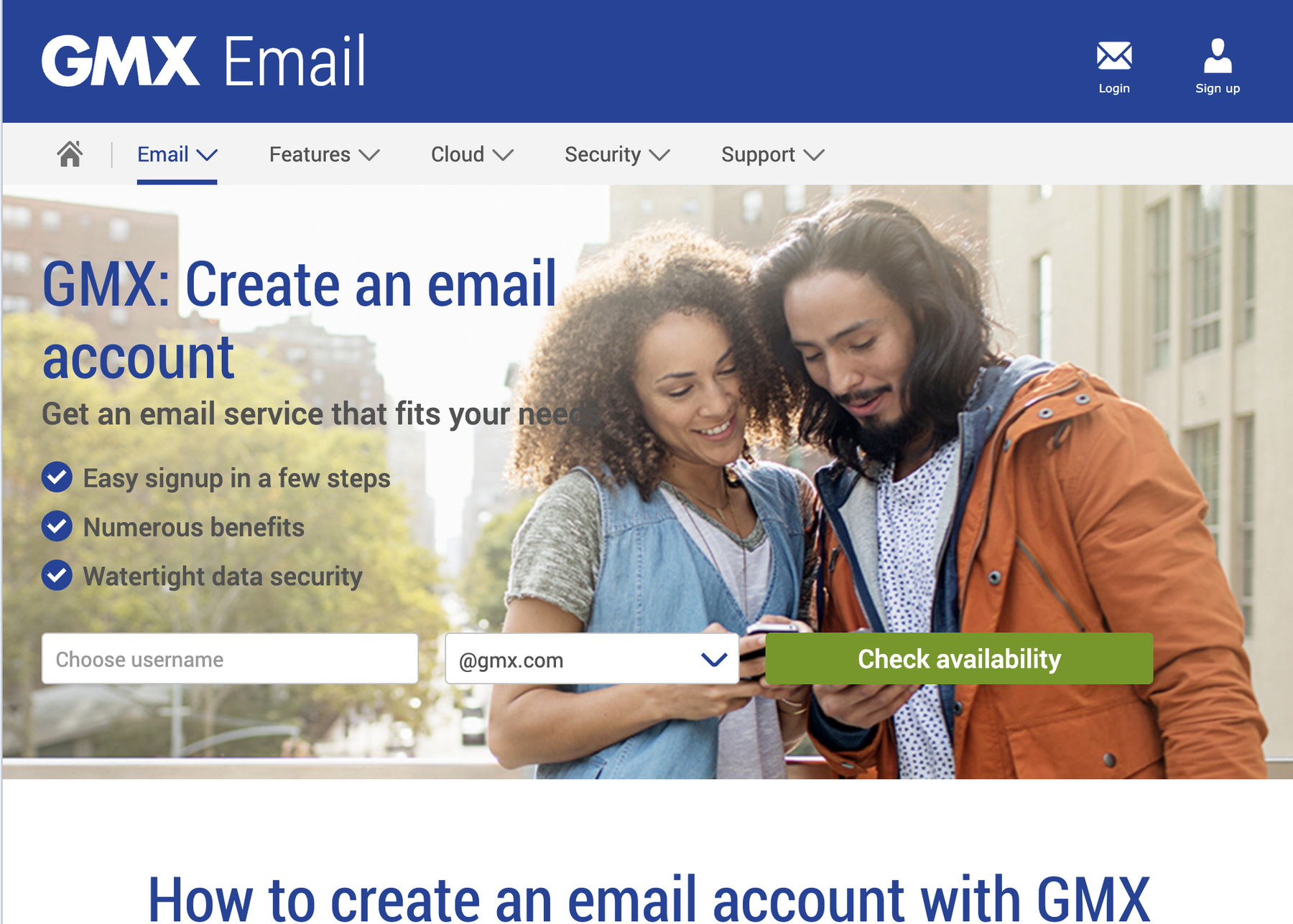
GMX is an email service provided by a German company called United Internet AG. It started in 1997 and became a popular email choice in Germany. Later, in 2007, GMX introduced an English version of its email service, called "GMX Mail," to reach users outside of Germany.
Today, it has around 20 million users worldwide.
GMX Mail is free to use and doesn’t charge users but relies on ads for revenue. For those in Germany, GMX also offers paid plans like GMX ProMail and GMX TopMail, which come with extra features.
However, these are not available for users in other languages.
One of GMX Mail's standout features is its 65GB of free email storage, which is far more than the 15GB offered by Gmail and Outlook. This allows you to store emails for years without worrying about running out of space.
Also, GMX Mail lets you send attachments of up to 50MB per email, which is generous compared to other services like Outlook’s 20MB and Yahoo Mail’s 25MB limits.
With its combination of free storage and useful features, GMX Mail is a strong option for anyone looking for a practical and reliable email service.
8. Tuta
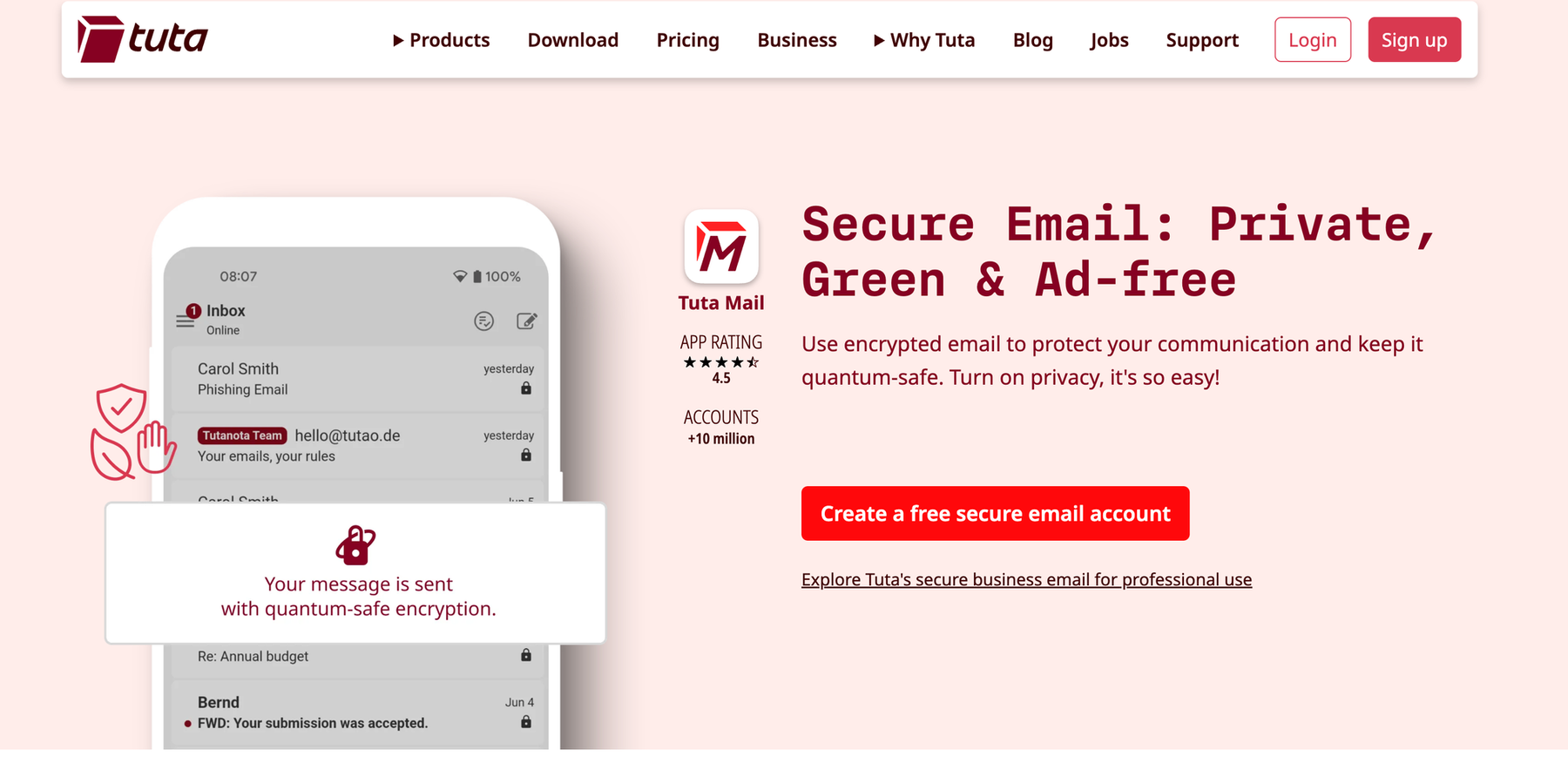
Tuta, formerly named Tutanota and based in Germany, is a privacy-first email provider designed to keep your communication secure and private. While it might not be as well-known as some larger email services, it stands out for its strong encryption and commitment to meeting strict EU privacy laws like GDPR.
All emails between Tuta users are automatically encrypted end-to-end, meaning only the sender and receiver can read them. Even emails sent to people outside Tuta can be encrypted with a shared password for added security.
Unlike some other systems, Tuta protects all parts of your email, including the subject line, and ensures your data stays safe at all times.
For everyday use, Tuta offers a free plan that includes secure email and a private calendar, though storage is limited to 1GB and search works for recent emails only. For more features, including up to 20GB of storage and extra tools like advanced search and multiple email aliases, there’s an affordable paid plan available.
Tuta is ideal for those who want a safe, encrypted email service that prioritizes both privacy and usability.
9. FastMail
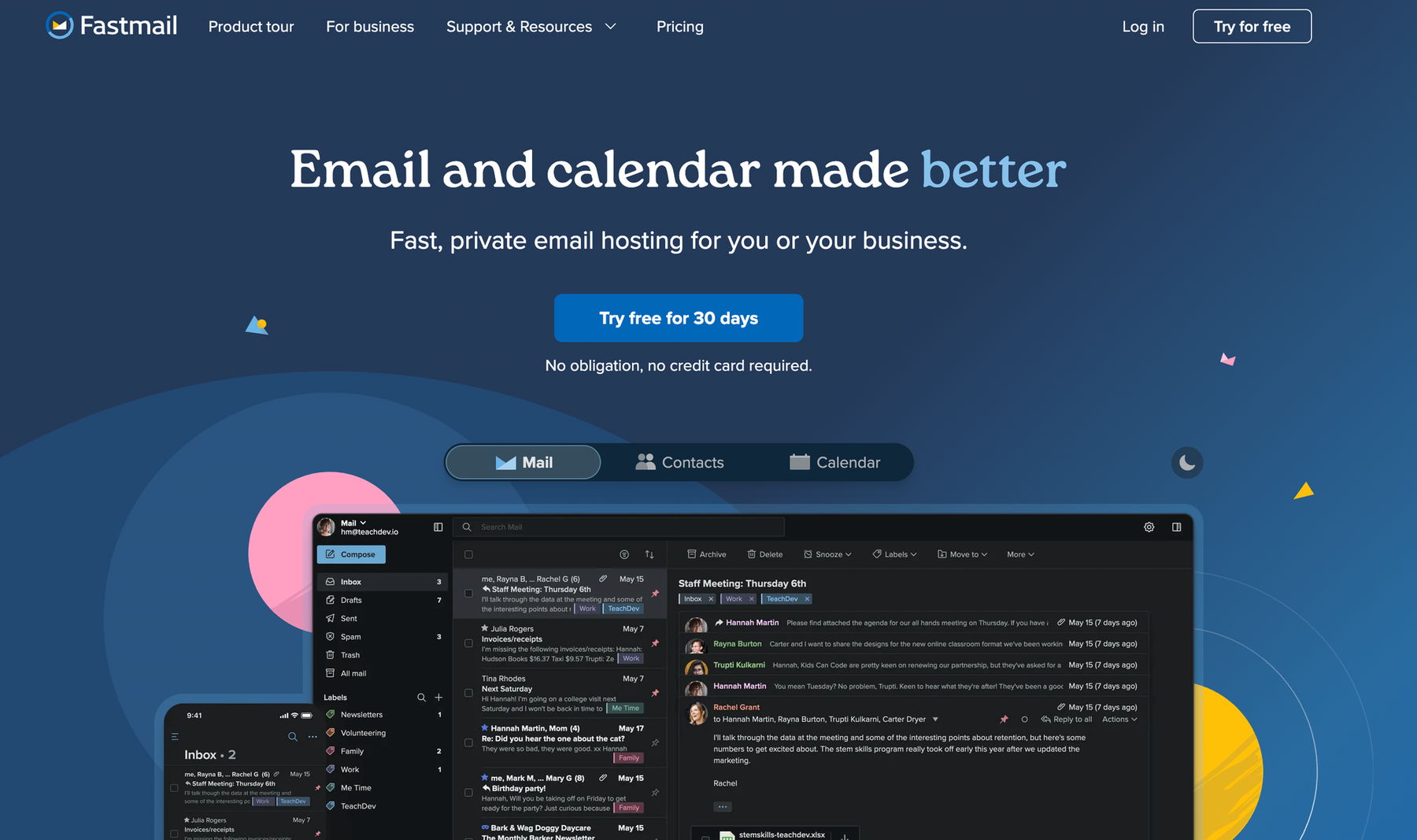
Fastmail is a reliable email service that brings email, calendars, contacts, notes, and file storage together in one platform.
Its simple design makes it easy to use for everyone, even if you’re not tech-savvy. While it isn’t packed with flashy features, Fastmail has been improving its tools for over 20 years, making it a solid choice.
It works with many email apps and services thanks to support for POP3, IMAP, CalDAV, and CardDAV. It offers helpful features like custom domain support for businesses, threaded conversations to keep emails organized, and full-text search to quickly find messages.
Other tools include spam filtering, “Send Later” for scheduling emails, and masked email addresses to protect your privacy when signing up for services.
Fastmail also prioritizes security, ensuring your data stays private. Though it doesn’t have live chat support, its detailed help center and responsive support team are available to assist with any issues.
While the pricing might feel high compared to some budget options, Fastmail is an excellent choice for those who value simplicity, reliability, and privacy.
10. Zoho Mail

Zoho Mail is a cost-effective and feature-rich email service that caters to businesses seeking an affordable solution with solid functionality.
Its integration with Zoho’s ecosystem makes it an attractive choice for teams already utilizing Zoho apps. With features like shared folders, tasks, and notes, it enhances collaboration and productivity. .
However, Zoho Mail does have some limitations to consider.
The integration options for third-party apps are somewhat restricted, which may be a drawback for businesses reliant on tools outside of Zoho. Additionally, the interface, while functional, could benefit from modernization to compete with popular alternatives like Google Workspace and Microsoft 365.
Zoho Mail is ideal for users prioritizing affordability and seamless integration within the Zoho suite, but others may find more suitable options elsewhere.
11. MXroute
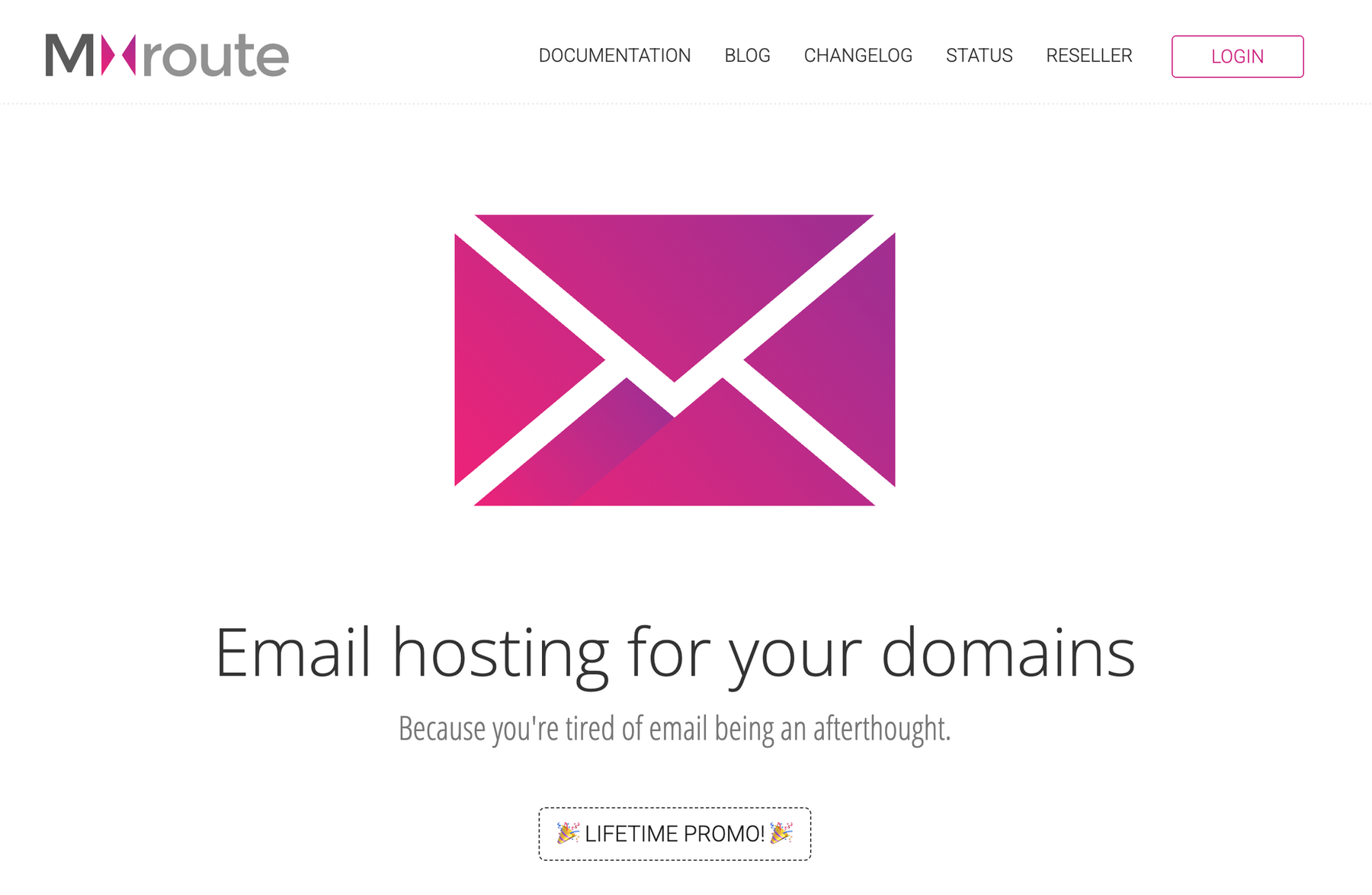
MXroute is an email service that works with your own domain, offering a simple and effective way to manage your emails. Unlike many other email services, MXroute prioritizes consistent email delivery and affordable pricing while giving you full control over your domain.
One of MXroute's standout features is its focus on making sure your emails arrive where they’re supposed to. Managing email delivery can be tricky, especially with major providers like Gmail or Yahoo, but MXroute uses high-quality servers and partnerships with tools like MailChannels to help your messages avoid spam folders and reach their destination smoothly.
MXroute also offers clear and simple pricing. Instead of charging per user or domain, it uses a storage-based model, making it cost-effective for businesses with multiple domains or large email storage needs.
Its easy-to-use interface simplifies tasks like setting up accounts and managing email operations, letting you focus on your business without any headaches. With affordability, reliability, and simplicity at its core, MXroute is a smart choice for businesses that want to improve their email management without overspending.
Email Relay Services:
1. Maileroo
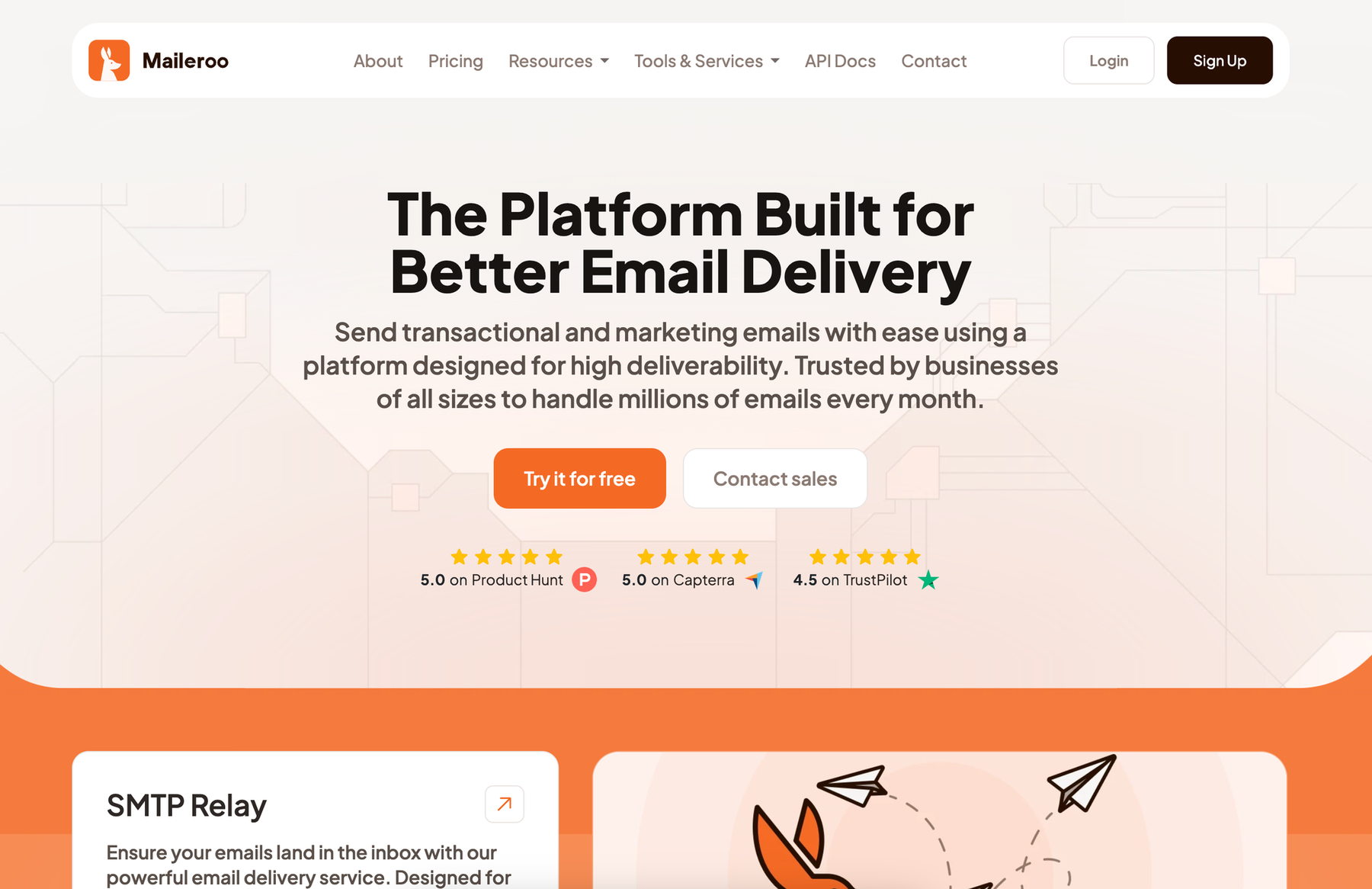
Maileroo offers a smart, efficient solution for managing transactional emails, combining fast delivery with useful features like automation and analytics. It’s designed to help you make the most of your email communication, whether you're trying to convert prospects into customers or grow your subscriber list.
It also makes it easier for you to manage your email needs with flexible, usage-based pricing. You can start with a free plan for up to 5,000 emails a month, and if you need more, upgrade options range from $10/month for 25,000 emails to $250/month for 1 million emails.
The platform’s user-friendly dashboard simplifies the setup of SMTP accounts and email API keys, making integration with apps, websites, or platforms quick and painless with minimal coding.
Built to scale, Maileroo handles everything from small to large email volumes without compromising speed or quality, and you can switch between plans anytime without being locked into a contract. It also supports unlimited domains and users per account, giving you the flexibility to manage your operations smoothly.
Security is a top priority, with TLS encryption and GDPR compliance protecting your data, and Maileroo offers tools to help maintain your sender reputation while resolving any delivery challenges.
2. SendGrid
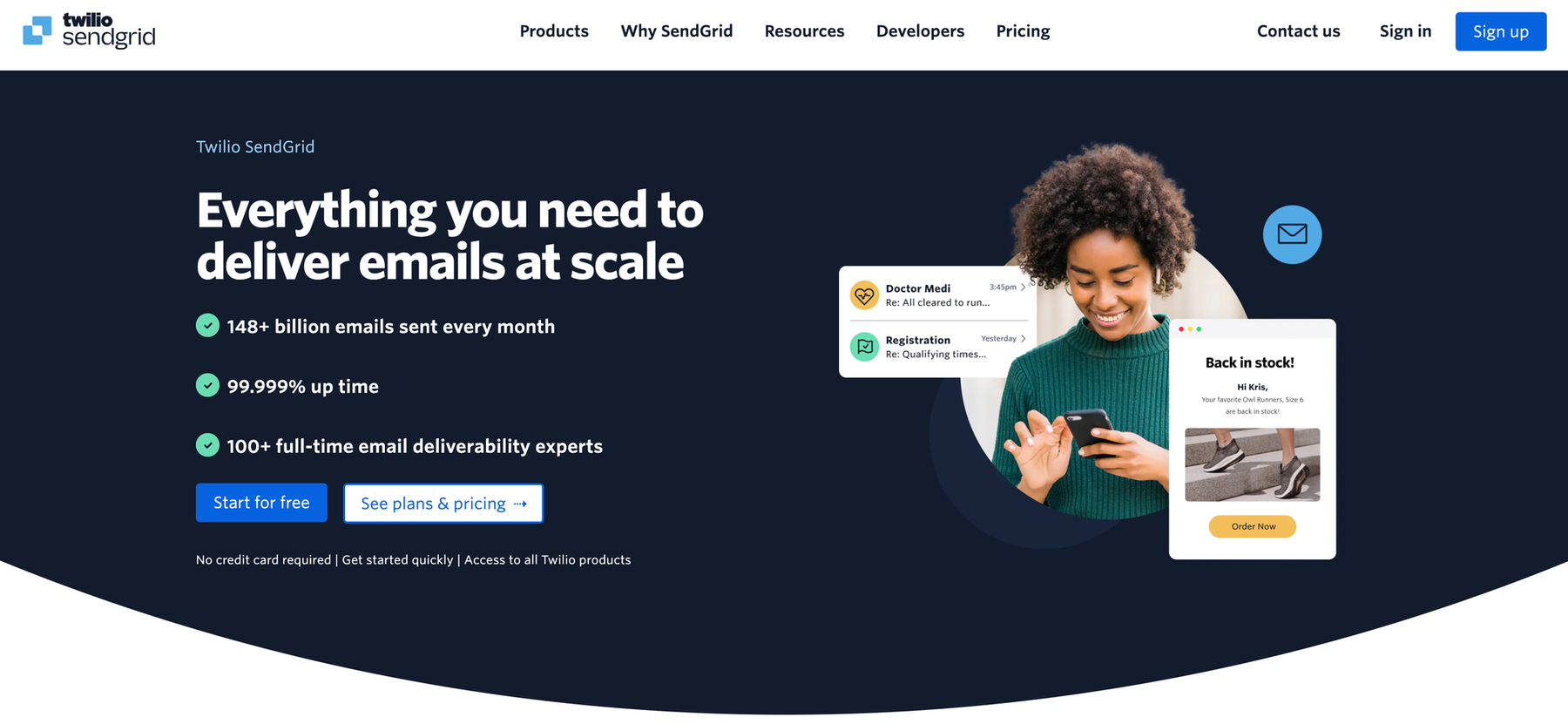
SendGrid offers a suite of features tailored to meet the needs of both beginners and advanced users.
From easy-to-use drag-and-drop tools to fully customizable coding options, the platform ensures that anyone can create visually stunning emails without hassle. This flexibility allows users to maintain their brand identity and deliver highly engaging, professional-quality emails to their audience.
Whether you’re a small startup or an enterprise-level business, SendGrid has its versatile pricing plans.
Starting with the Free Plan for small-scale needs, all the way to the Premier Plan with custom solutions and dedicated support, there’s an option for everyone. With competitive pricing, user-friendly design tools, and reliable delivery, SendGrid is a powerful resource for anyone looking to elevate their email marketing game.
3. Mailgun

With its ease of use, flexibility, and dependable delivery, Mailgun is a great choice for managing business emails efficiently.
Mailgun is an email service designed to simplify email management for businesses and developers. It allows users to send, receive, and track emails effortlessly, making it an ideal solution for companies that rely on strong communication with their customers.
With features like API integrations, SMTP relay, and automation tools, Mailgun makes setting up email functionality straightforward and adaptable to a variety of needs. Its tools support seamless email sending, from reducing manual workload with automated handling to enhancing performance through analytics that track delivery and engagement.
Mailgun also prioritizes reliability and accessibility. Users can depend on secure email delivery, verified by industry protocols like SPF and DKIM, ensuring messages reach the inbox.
The platform’s intuitive interface is suitable even for non-technical users, and its integration with over 65 tools allows it to fit smoothly into existing workflows.
Also, Mailgun caters to businesses of all sizes with flexible pricing plans, including free trials, pay-as-you-go options, and custom packages for advanced needs.
4. Bird

Bird is a cloud-based service that helps businesses send emails reliably and efficiently.
Known for its ability to handle high volumes of email traffic, Bird (previously known as SparkPost) also offers powerful tools to track email performance.
These insights allow businesses to ensure their messages are not just delivered but also make a meaningful impact on their audience. Whether it's order confirmations, promotional emails, or critical notifications, Bird is designed to help businesses communicate effectively and achieve their goals.
It's designed for speed, scalability, and high deliverability. Features such as predictive scheduling, detailed performance analytics, and easy integration with existing systems help businesses of all sizes streamline their email operations.
5. turboSMTP
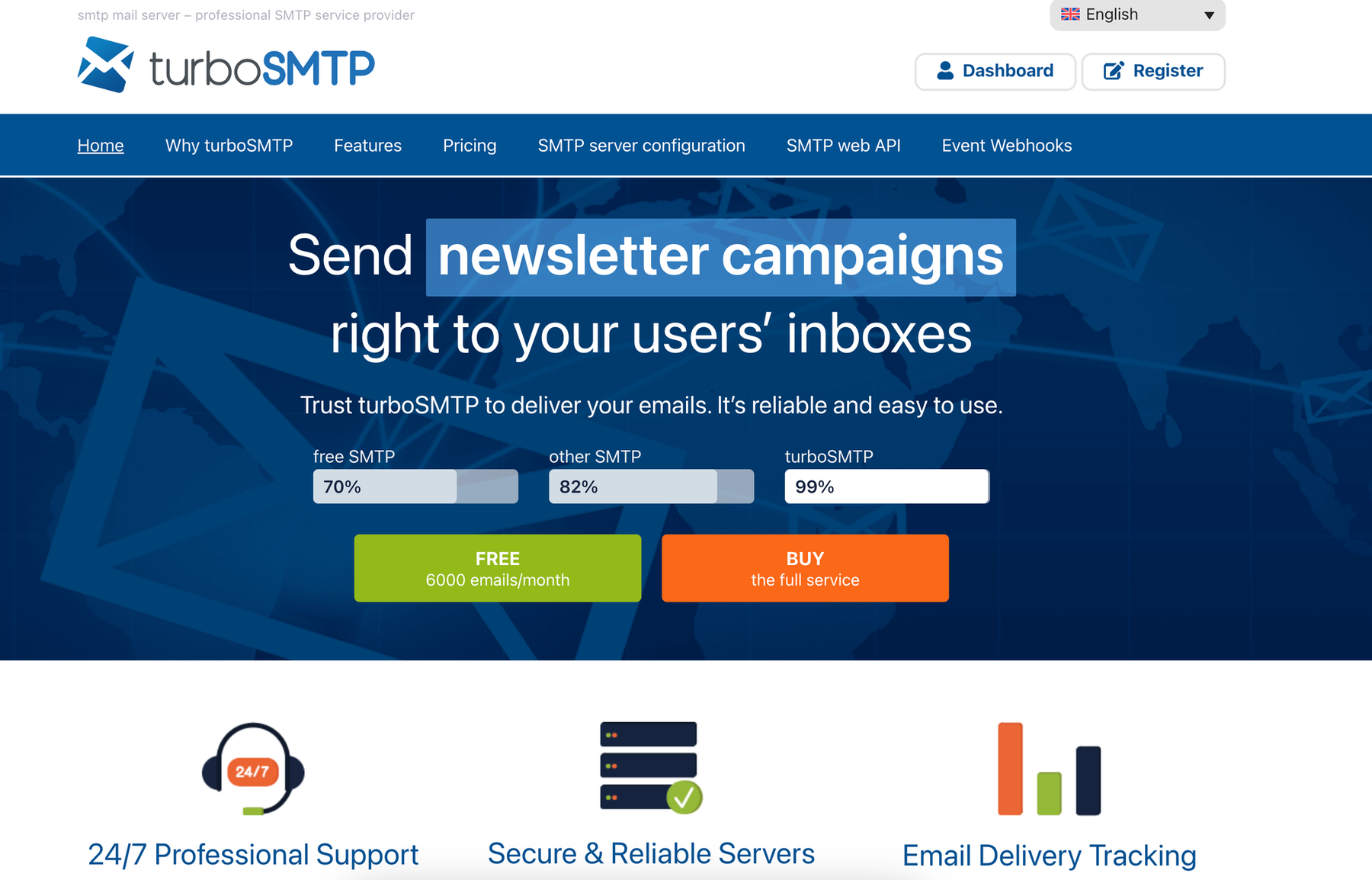
TurboSMTP makes email sending both simple and effective, ensuring that your messages avoid spam filters and reliably reach recipients' inboxes.
With features like SPF, DKIM, and DMARC authentication, it helps maintain your email reputation and guarantees high deliverability.
The platform is easy to integrate with popular email clients like Outlook or Gmail, enabling users to start sending emails quickly. Whether it’s managing transactional or bulk emails, TurboSMTP ensures reliable delivery and provides detailed tracking and analytics to optimize your campaigns.
TurboSMTP offers flexible pricing plans to suit different needs, starting with a free plan for low-volume users and scaling to customized enterprise solutions for large businesses.
Plans include the Starter Plan at $15/month for 10,000 emails and advanced options ranging up to $550/month, supporting higher volumes with enhanced capabilities. Users can send transactional emails like invoices and password resets, conduct marketing campaigns, and manage bulk emailing effortlessly.
6. SMTP.com
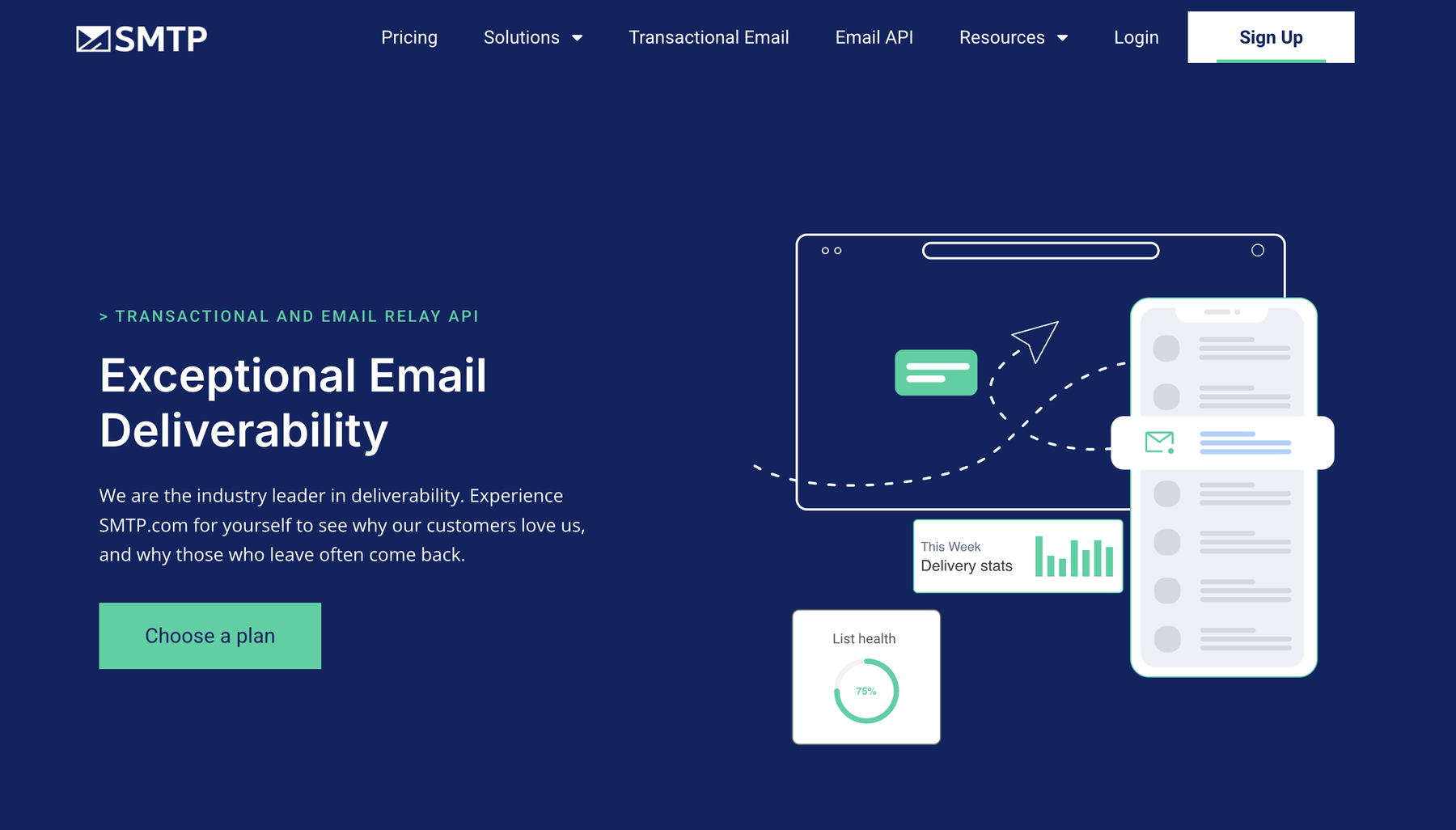
SMTP.com is a platform designed to ensure reliable and efficient email delivery for businesses of all sizes.
Whether you’re sending transactional emails such as order confirmations or running marketing campaigns, SMTP.com makes sure your messages reach the intended inbox without landing in spam folders.
With over 20 years of experience, the platform is trusted globally for its dependable service, advanced tools to protect sender reputation, and seamless integration with other software, including CRMs and custom apps.
Additionally, SMTP.com offers detailed email analytics to help businesses monitor performance metrics like open rates and clicks, providing invaluable insights to optimize campaigns.
The platform caters to a wide range of businesses with its scalable plans and flexible email volume capacities.
Key features include reliable email delivery, the ability to handle both transactional and marketing emails, dedicated IPs for maintaining deliverability, and 24/7 support for any challenges.
7. Resend.com
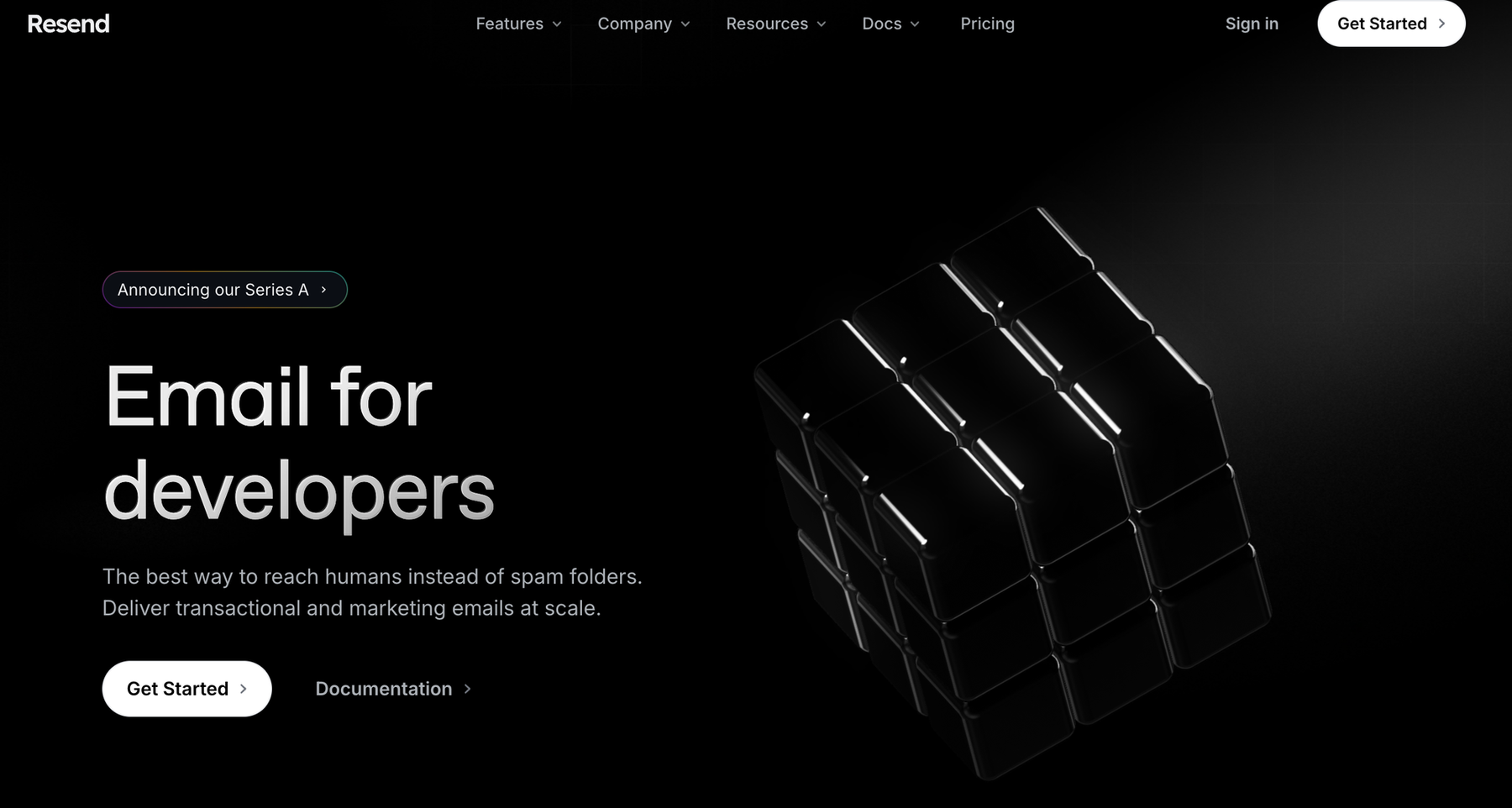
Resend is a straightforward yet powerful email service designed to simplify how businesses handle transactional and marketing emails.
Its intuitive interface and robust API ensure smooth integration with various tools and support popular programming languages, offering flexibility to developers.
Resend focuses on enhancing deliverability with features such as branding support and dedicated IP addresses, ensuring emails land in the right inboxes.
Also, it provides advanced tools to test emails, measure performance metrics, and manage contact lists effectively, allowing businesses to optimize their email campaigns and effortlessly connect with their audience.
8. Amazon SES
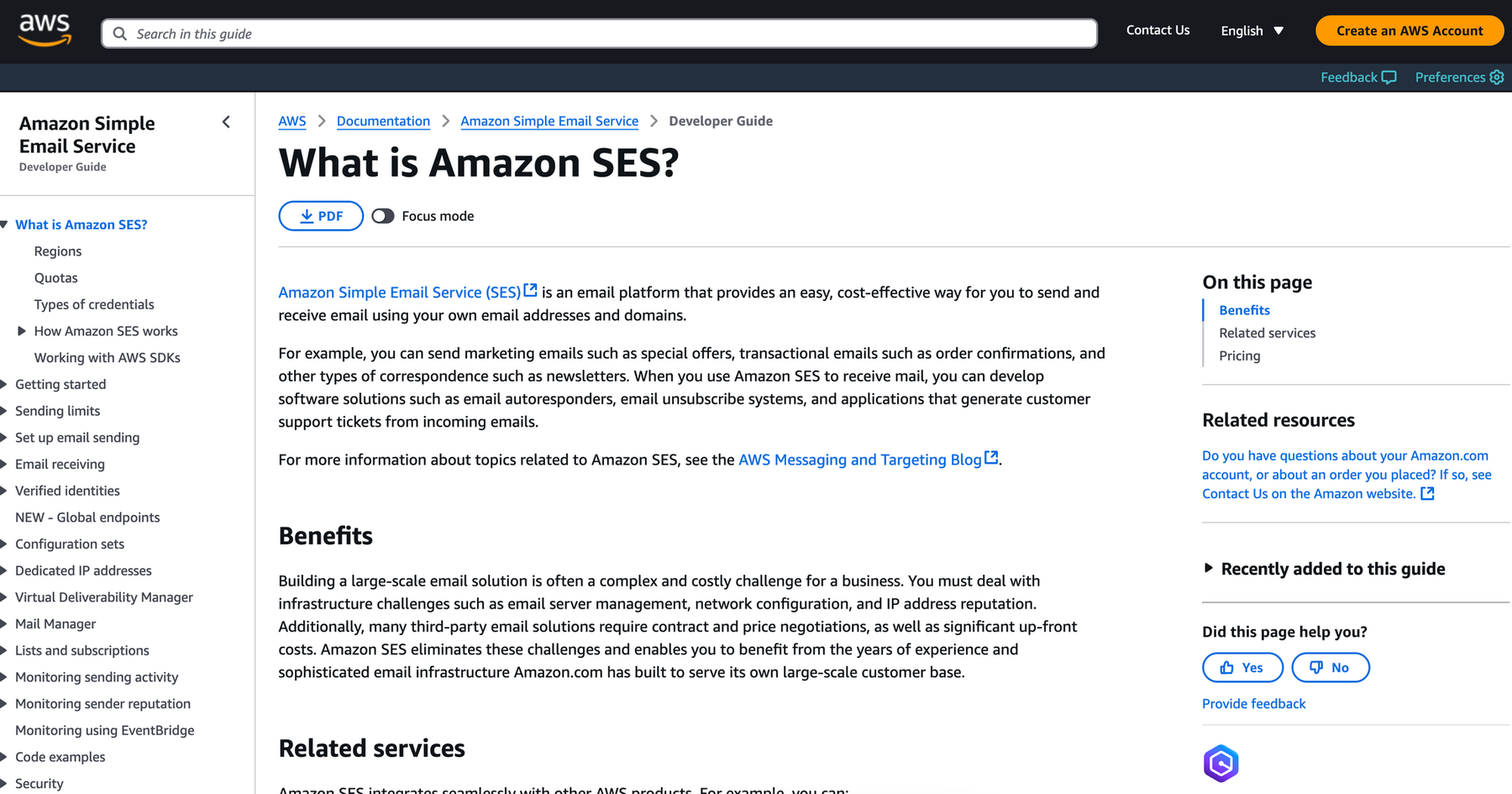
Amazon Simple Email Service (SES) also provides built-in security features to protect your emails and ensure compliance.
Using authentication methods like SPF, DKIM, and DMARC, SES helps improve email deliverability and prevents spoofing or phishing attempts. Additionally, SES integrates seamlessly with other AWS services, such as Amazon S3 for storage and Amazon CloudWatch for monitoring and logging.
This integration allows businesses to create a unified workflow for managing their email campaigns efficiently.
Adding to this, SES enables users to customize their sender identity with verified domains and personalized email addresses, adding a professional touch to their emails.
The pay-as-you-go pricing model ensures that businesses only pay for what they use, making it a cost-effective choice for organizations of all sizes.
9. Elastic Email
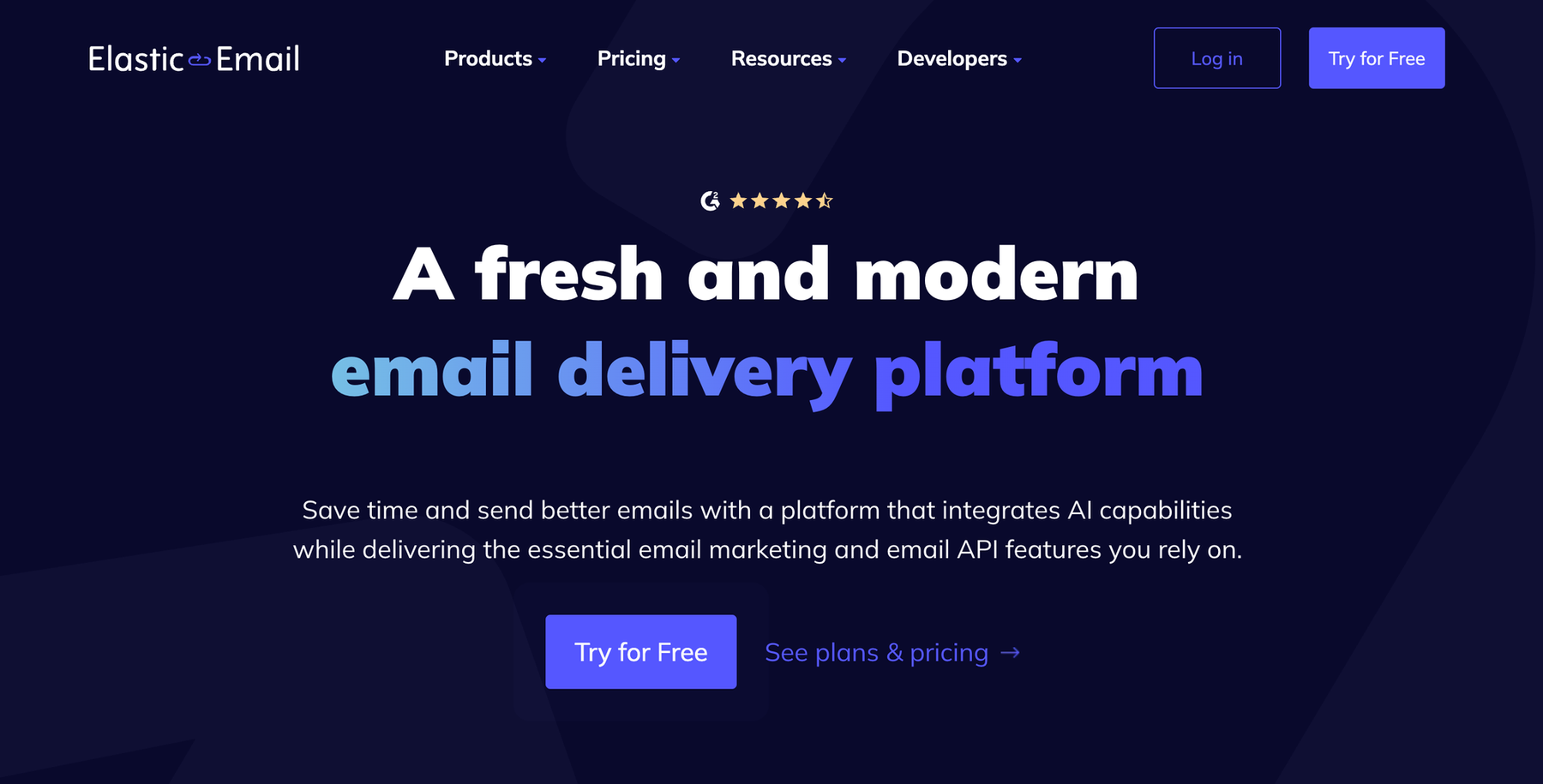
Elastic Email is an easy-to-use service that helps businesses of all sizes send and manage their email campaigns.
It supports both marketing and transactional emails, offering tools to track performance, automate tasks, and view detailed insights.
With simple integration options like APIs or SMTP relay, it’s straightforward to connect Elastic Email to existing apps or websites. Flexible pricing plans mean businesses can select what suits their needs and scale as they grow.
Features like email validation, deliverability tools, and a user-friendly dashboard make it a practical choice for creating and running successful email campaigns without requiring technical expertise.
10. Brevo
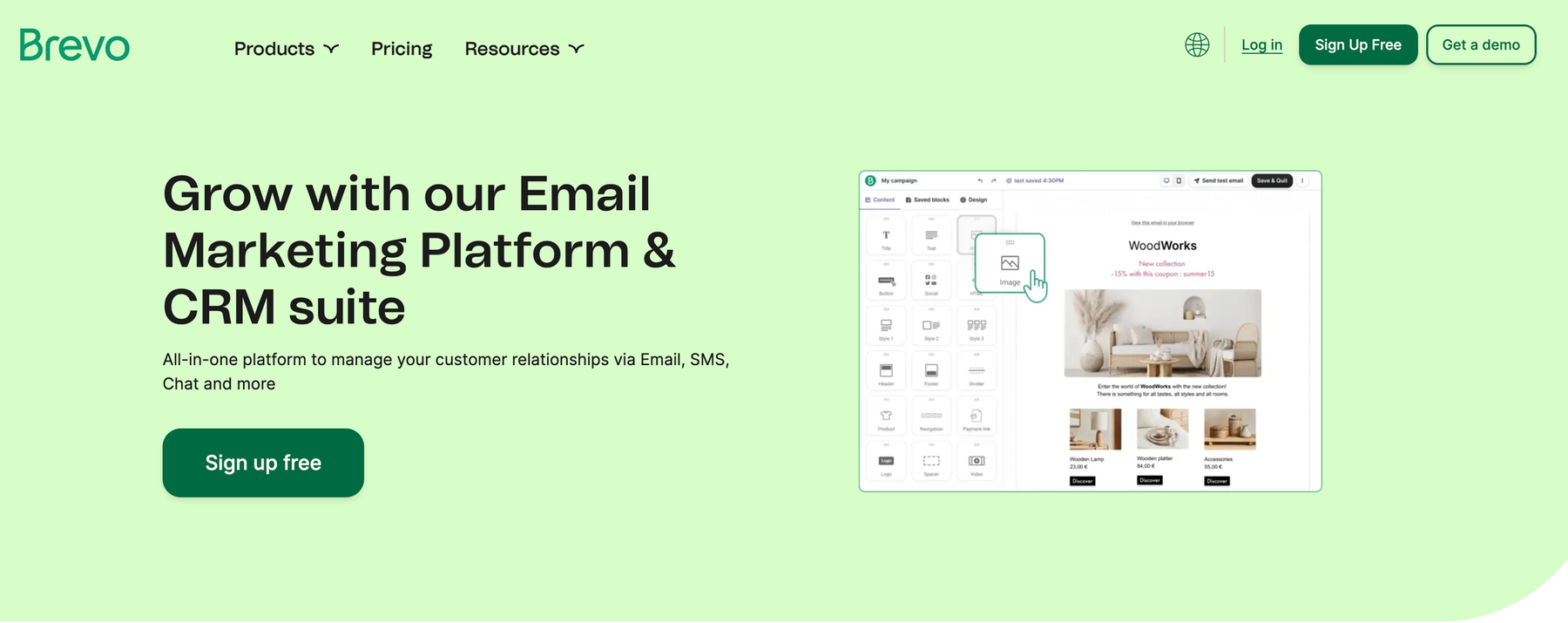
Brevo (formerly Sendinblue) is a simple and versatile marketing platform that helps businesses handle their email campaigns, automate tasks, and connect with customers.
It offers tools for sending emails, running SMS campaigns, and managing customer relationships (CRM).
The platform is easy to use, with a clear interface that lets anyone create and manage campaigns without needing technical skills. Brevo also works with many popular apps, making it a flexible choice for different business needs.
With options for free and affordable pricing plans based on how many emails you send, Brevo is suitable for businesses of all sizes. Features like A/B testing, detailed reports, and workflow automation help improve customer engagement and boost results.
10. Mailtrap SMTP
Mailtrap SMTP is a reliable email delivery service designed for transactional and marketing emails. With a simple setup and robust API, it integrates easily into your existing systems, supporting popular programming languages to provide flexibility for developers.
The service focuses on ensuring good deliverability with features like detailed analytics and email testing, helping you monitor and optimize your email performance. Mailtrap also offers tools for managing contact lists, making it easier for businesses to improve their email campaigns and maintain consistent communication with their audience.
Mailtrap provides a free plan that is ideal for small-scale businesses, while its paid plans offer more features and start from $15 per month for 10K emails.
Email Marketing Services
1. Maileroo
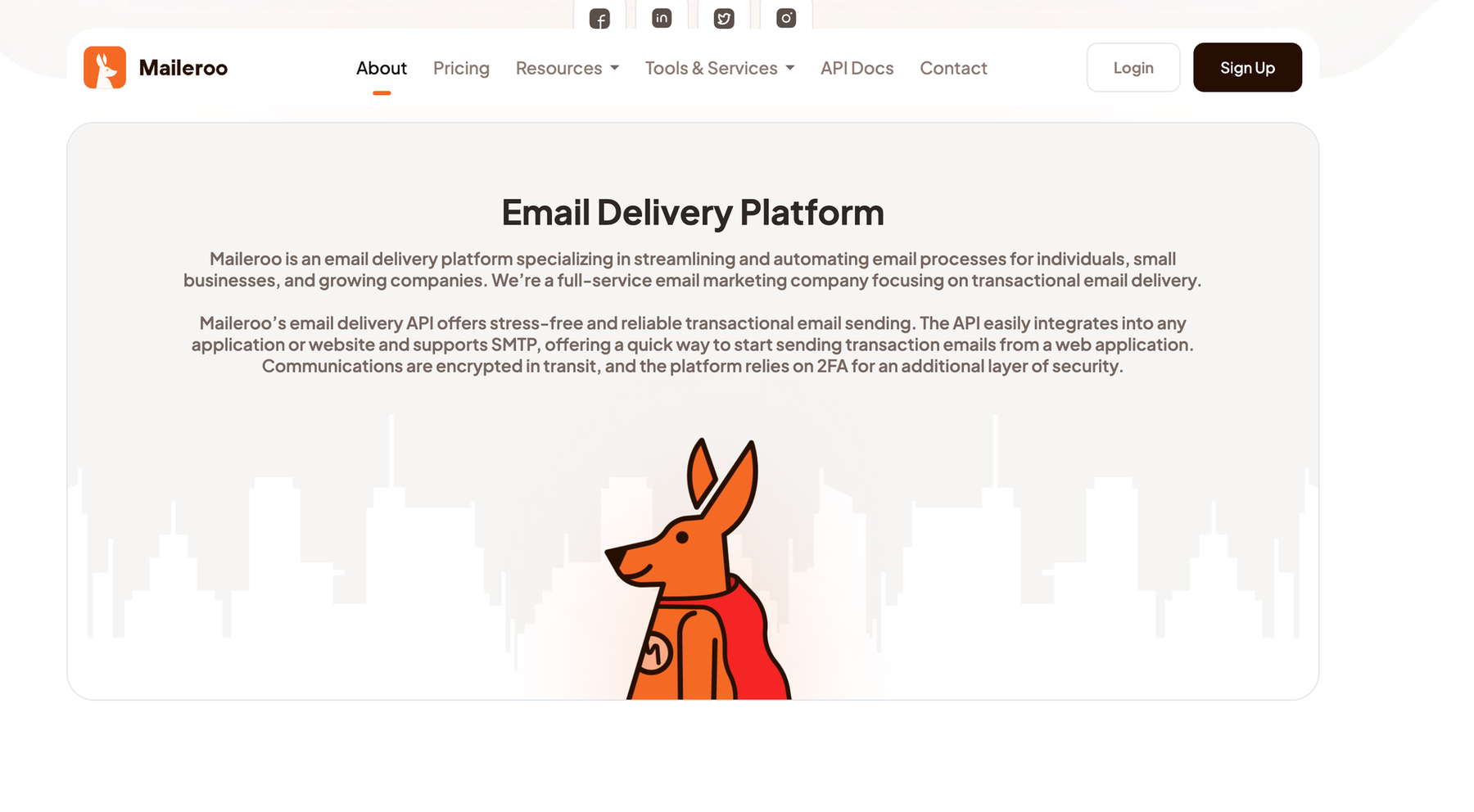
Maileroo is a new email marketing tool that makes it easy for businesses of all sizes to manage their email campaigns.
The platform is simple to use, with tools to create, send, and track emails. Its drag-and-drop editor helps users design professional-looking emails without any special skills.
Maileroo also provides ready-made templates that can be customized to fit your brand, saving time. The platform offers helpful reports with details like open rates and clicks, so you can see how your campaigns are performing.
You can also group your email list into segments to send messages to specific audiences. With affordable plans and features that grow with your business, Maileroo helps improve engagement and get better results from email marketing.
2. Mailercloud

Mailercloud offers a robust suite of tools designed to cater to both beginners and enterprise-level users looking to streamline their email marketing.
From a simple drag-and-drop builder to AMP-powered interactive elements and advanced automation workflows, Mailercloud allows users to create dynamic, responsive email campaigns without technical barriers. This versatility helps brands maintain consistency, improve engagement, and deliver a more personalized customer experience.
Whether you’re a solo entrepreneur, a small business, or a large organization managing high-volume campaigns, Mailercloud has flexible pricing and features to match your goals.
Starting with a Free Plan for up to 1,000 subscribers, Mailercloud scales up to meet complex enterprise needs with powerful features like segmentation, ECDUs (Event-Centric Data Units), and automation triggers. With competitive pricing, an intuitive interface, and excellent deliverability, Mailercloud is an all-in-one solution for businesses serious about scaling their email marketing.
3. Klaviyo
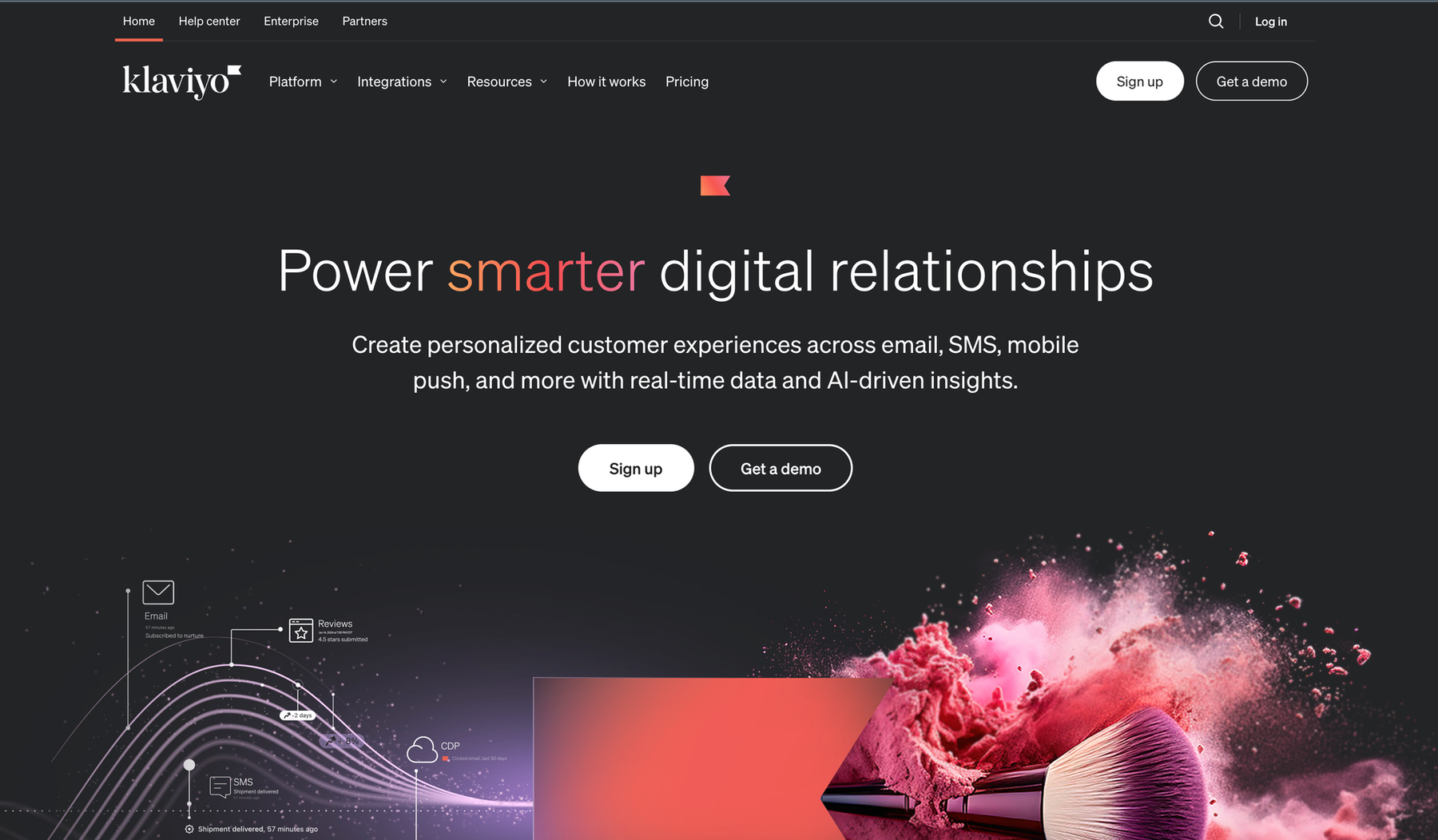
Klaviyo is an email and SMS marketing tool made for online stores.
It works well with platforms like Shopify, WooCommerce, and BigCommerce, helping businesses send personalized messages to their customers. By using customer data such as shopping habits and past purchases, Klaviyo makes it easy to create targeted campaigns.
The platform includes a simple drag-and-drop editor and pre-designed templates, so designing emails is quick and straightforward. Klaviyo also offers tools for automation, saving time by scheduling messages to send automatically.
Plus, its detailed reports show how well your campaigns are performing, helping you improve your strategy. While it might cost more than some other tools, its powerful features make it a popular choice for online businesses wanting to grow customer connections and boost sales.
4. Mailchimp
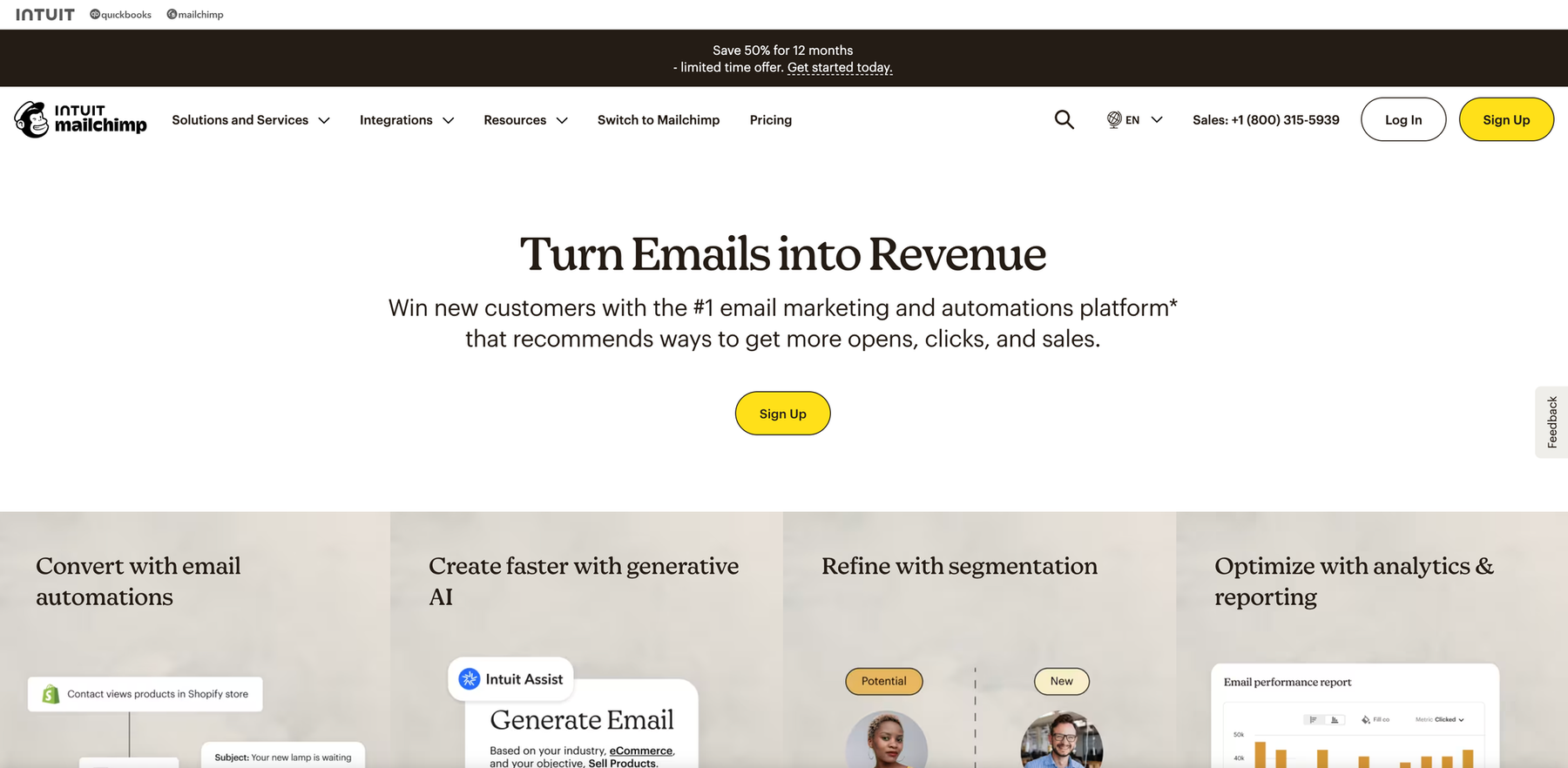
Mailchimp is a well-known email marketing tool that works for businesses of all sizes.
It’s designed to be simple and easy to use, even if you’re not tech-savvy. With its drag-and-drop editor and ready-made templates, creating professional-looking emails is quick and hassle-free.
Mailchimp also helps you automate email campaigns and gives helpful suggestions to improve your content. Beyond emails, it offers tools for social media posts, landing pages, and managing customer data, all in one place.
You can also group your audience and send personalized messages to improve engagement. Plus, with flexible pricing, including a free option for small businesses, Mailchimp is a popular choice for growing your marketing reach.
5. Braze
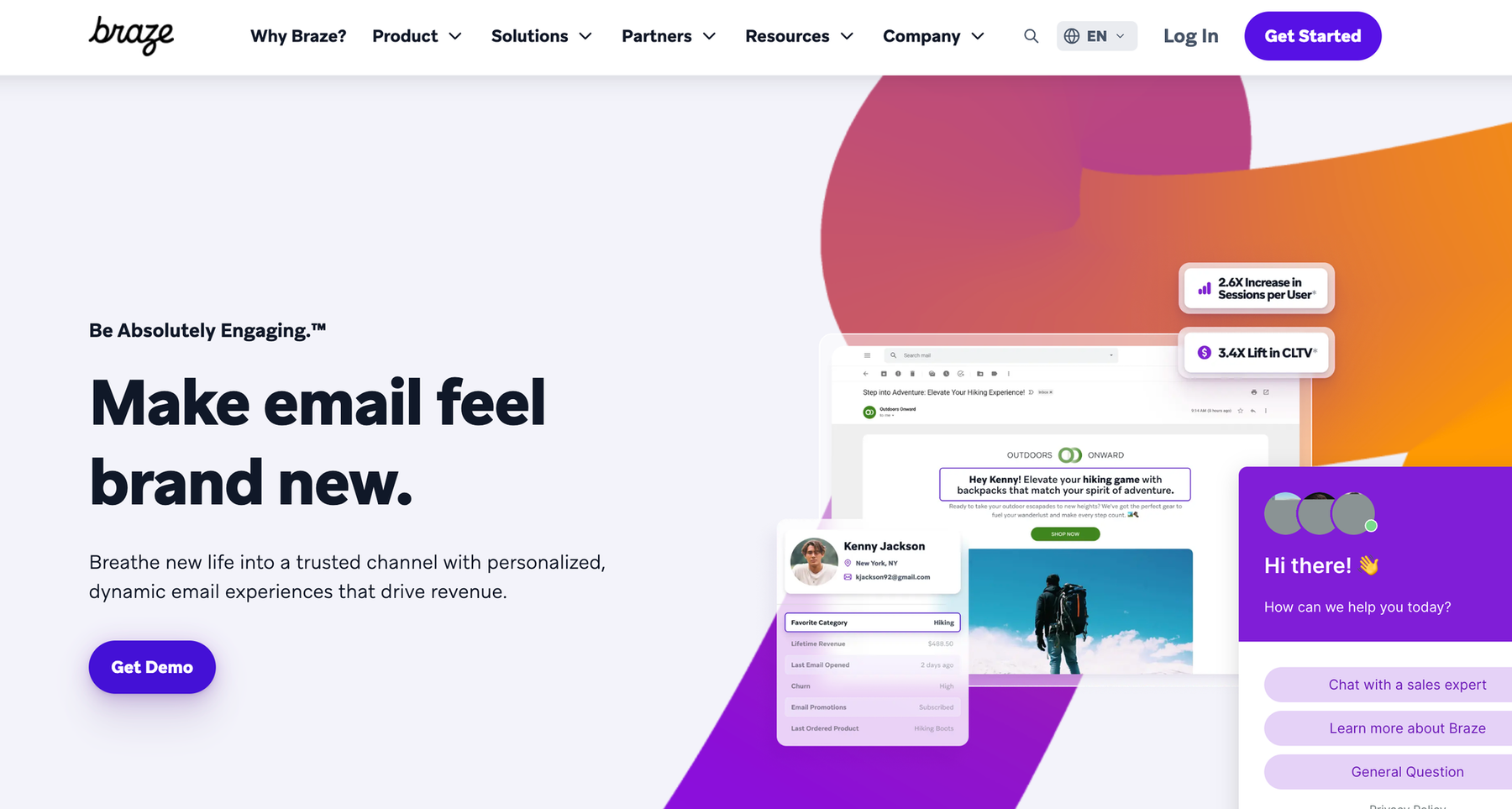
Braze is a platform that helps businesses connect with their customers in a more personal way.
It allows companies to send tailored messages through email, push notifications, texts, and in-app messages. With Braze, businesses can easily design campaigns that adapt based on how customers interact with them.
One of its key strengths is bringing together customer data from different sources to create more meaningful and relevant messages. Tools like segmentation and A/B testing make it simple to fine-tune strategies and improve engagement.
Braze is also easy to use, integrates well with other tools, and can scale as a business grows, making it a great choice for those who want to manage marketing across multiple channels.
6. Flodesk

Flodesk is a simple and stylish email marketing tool made for small businesses, creatives, and entrepreneurs.
It’s easy to use, with drag-and-drop features and beautifully designed templates that you can quickly customize to match your brand.
Flodesk stands out with its flat monthly fee, letting you send unlimited emails to unlimited subscribers without worrying about extra costs as your audience grows. It also offers automation to help you send welcome emails, nurture relationships, or stay connected with your audience.
While it may not have all the advanced analytics and integrations of bigger platforms, Flodesk focuses on being easy to use and helping you create beautiful, impactful emails effortlessly.
7. My Emma
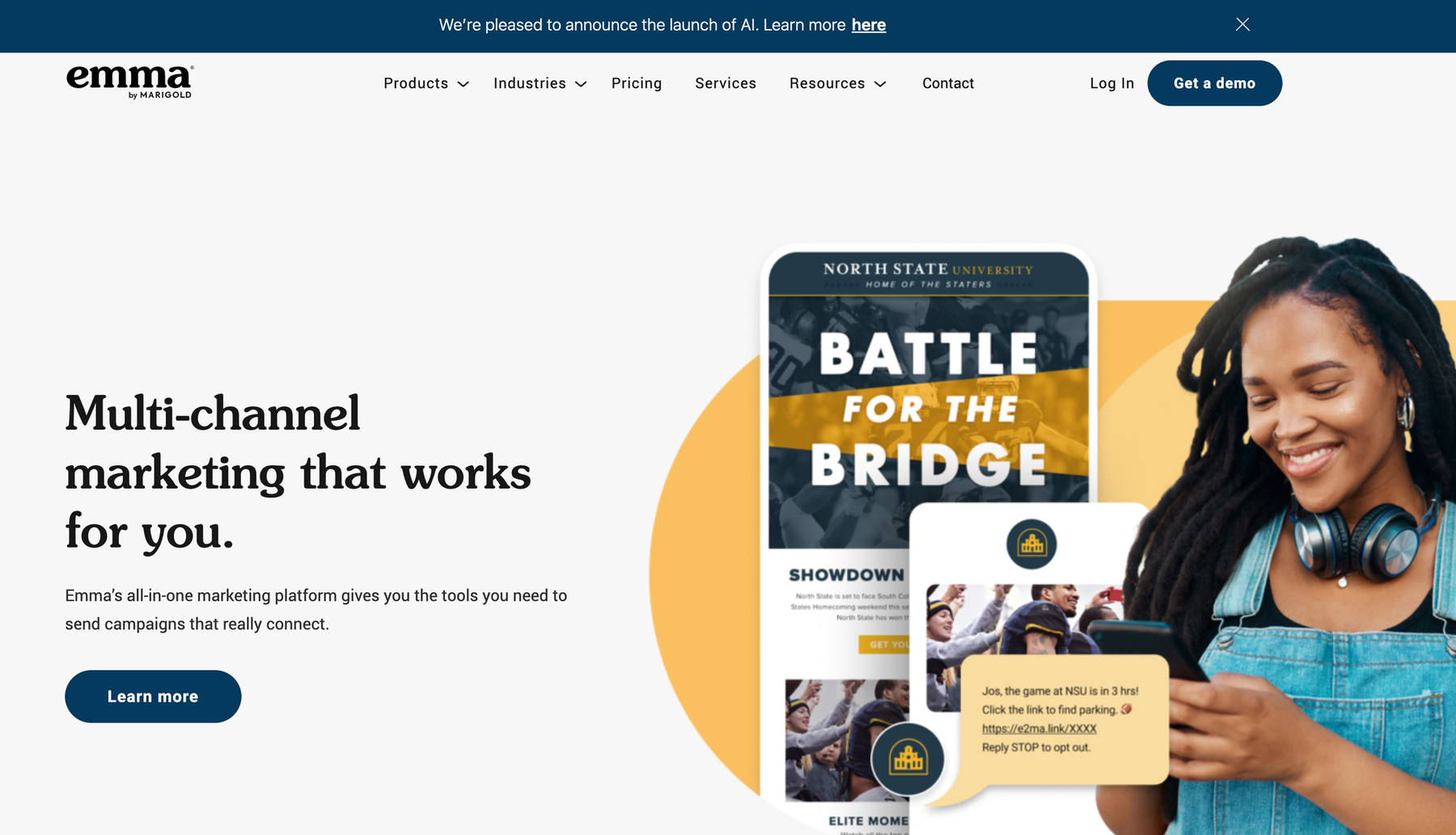
My Emma is an email marketing tool designed to make creating personalized email campaigns simple and effective.
It offers features like pre-designed templates, automation, and audience targeting. These tools help businesses create professional emails and send the right message to the right people based on their interests or actions.
My Emma also works seamlessly with other tools like Salesforce, Shopify, and Eventbrite, making it a flexible choice for many industries. Plus, it provides detailed reports so you can see how your emails perform and improve your future campaigns.
8. Campaign Monitor
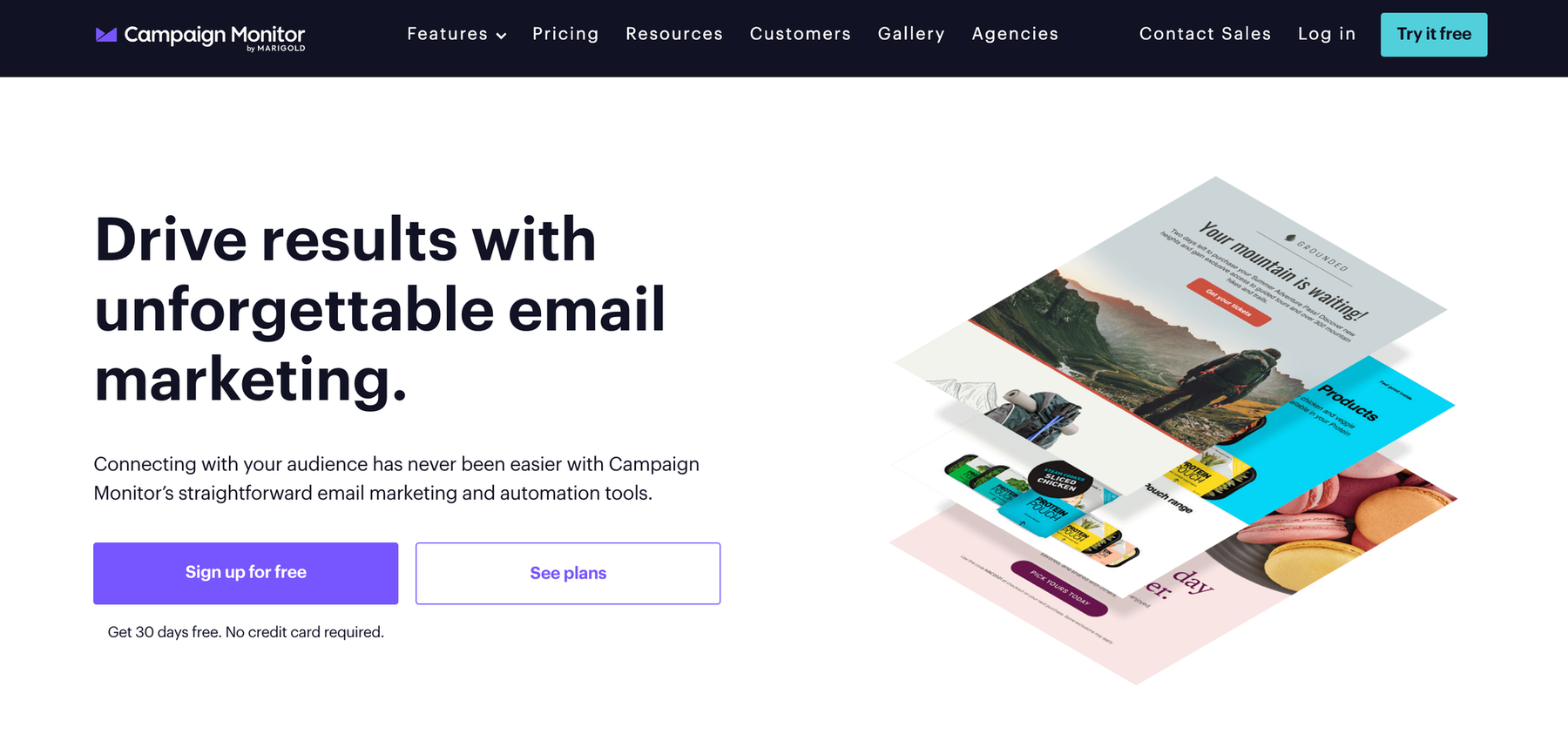
Campaign Monitor is a user-friendly email marketing platform designed to help businesses create engaging and personalized emails.
Its drag-and-drop editor makes it simple to design professional emails without needing technical skills. The platform offers customizable templates, making it easy for anyone to get started.
With features like audience segmentation and automation, you can send tailored emails based on customer preferences or actions, such as birthday greetings or follow-ups. It also integrates with popular apps like Shopify, Salesforce, and WordPress, making it a flexible choice for growing businesses.
Plus, real-time analytics help you track performance and improve your campaigns.
9. MooSend
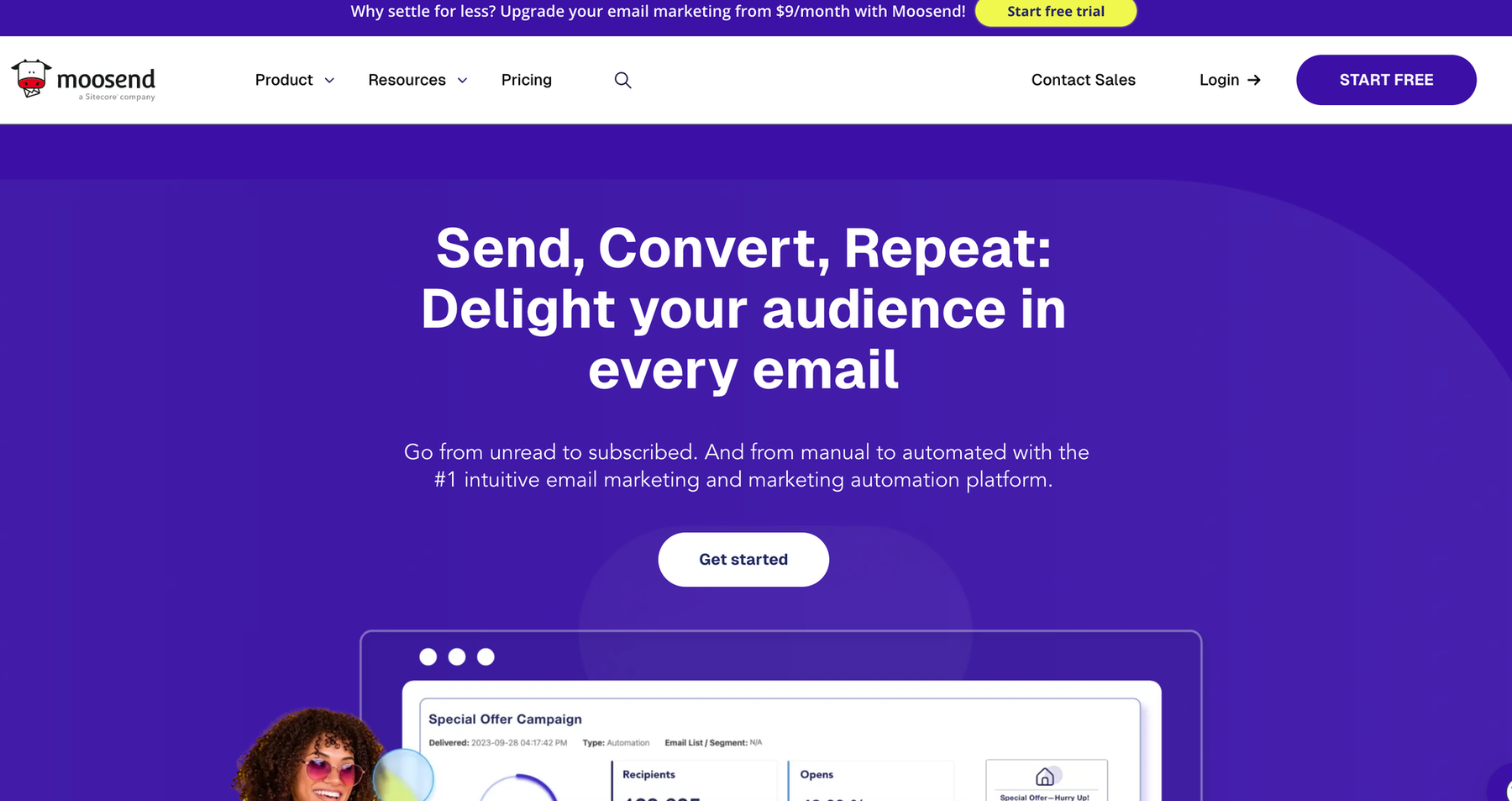
Moosend is an easy-to-use email marketing tool suitable for all kinds of businesses.
It helps you create, manage, and track email campaigns without any hassle. With its simple drag-and-drop editor, anyone can design professional-looking emails—even without prior experience.
Moosend also provides ready-made templates that you can customize to match your brand. One of its standout features is automation, which lets you create workflows to greet new subscribers, send reminders, or reconnect with inactive customers. You can also divide your audience into groups based on their preferences for more targeted messaging.
Detailed reports show you how your emails are performing, like how many were opened or clicked, so you can improve with each campaign.
Plus, Moosend connects easily with e-commerce platforms like Shopify and WooCommerce, making it an excellent choice for online stores to increase customer engagement and sales.
10. Omnisend
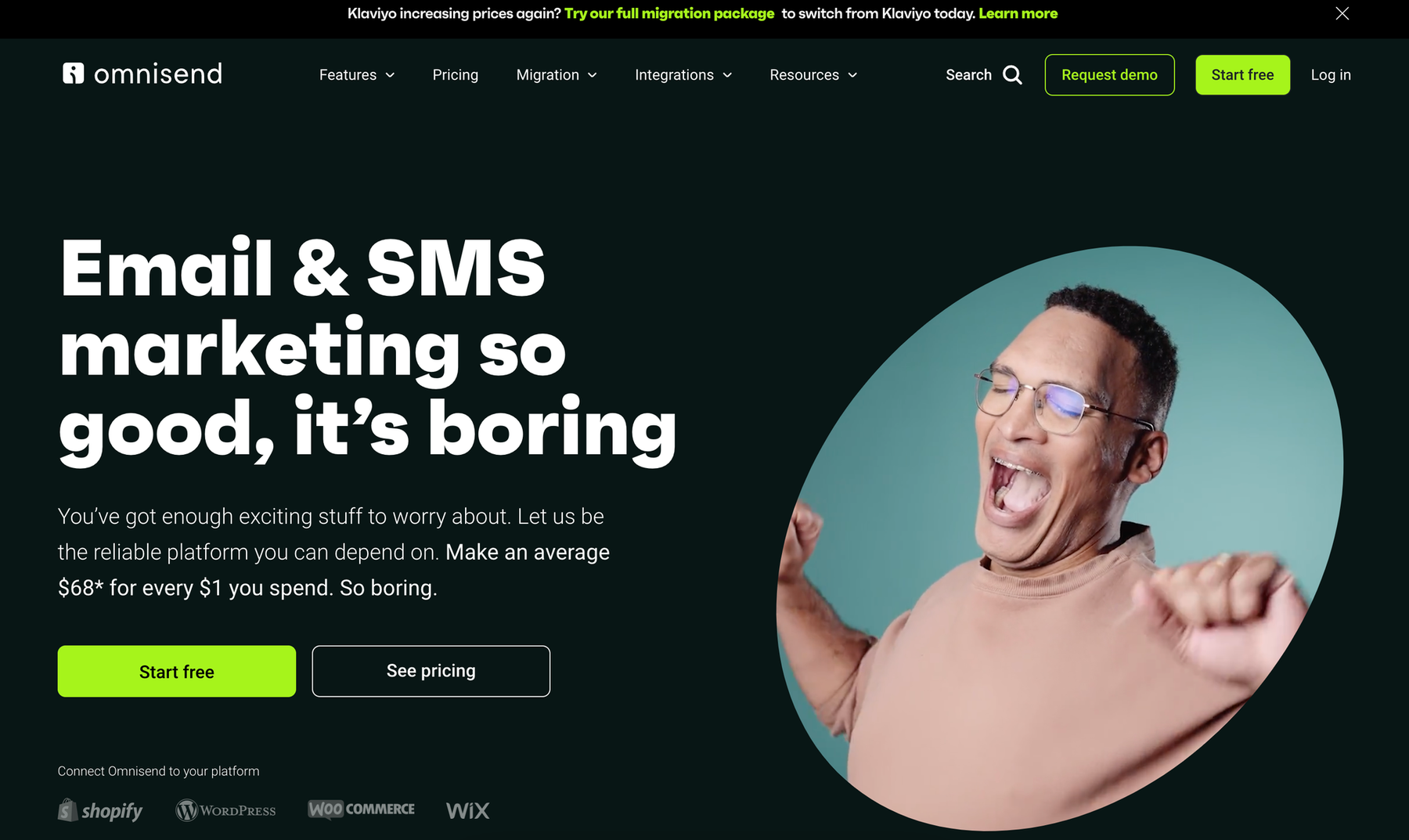
Omnisend is a platform for email and SMS marketing, designed especially for online stores. It helps businesses connect with customers through email, text messages, and other channels—all in one place.
With Omnisend, you can send targeted messages and set up automated workflows like welcome emails, cart reminders, and order updates to save time and boost sales. It also lets you group customers based on their shopping habits or interests for more personalized campaigns.
The platform works smoothly with popular online store tools like Shopify and WooCommerce. Plus, its drag-and-drop editor and customizable templates make creating professional campaigns quick and simple. You can also check detailed reports to see how your messages are performing and improve your results.
11. MailerLite
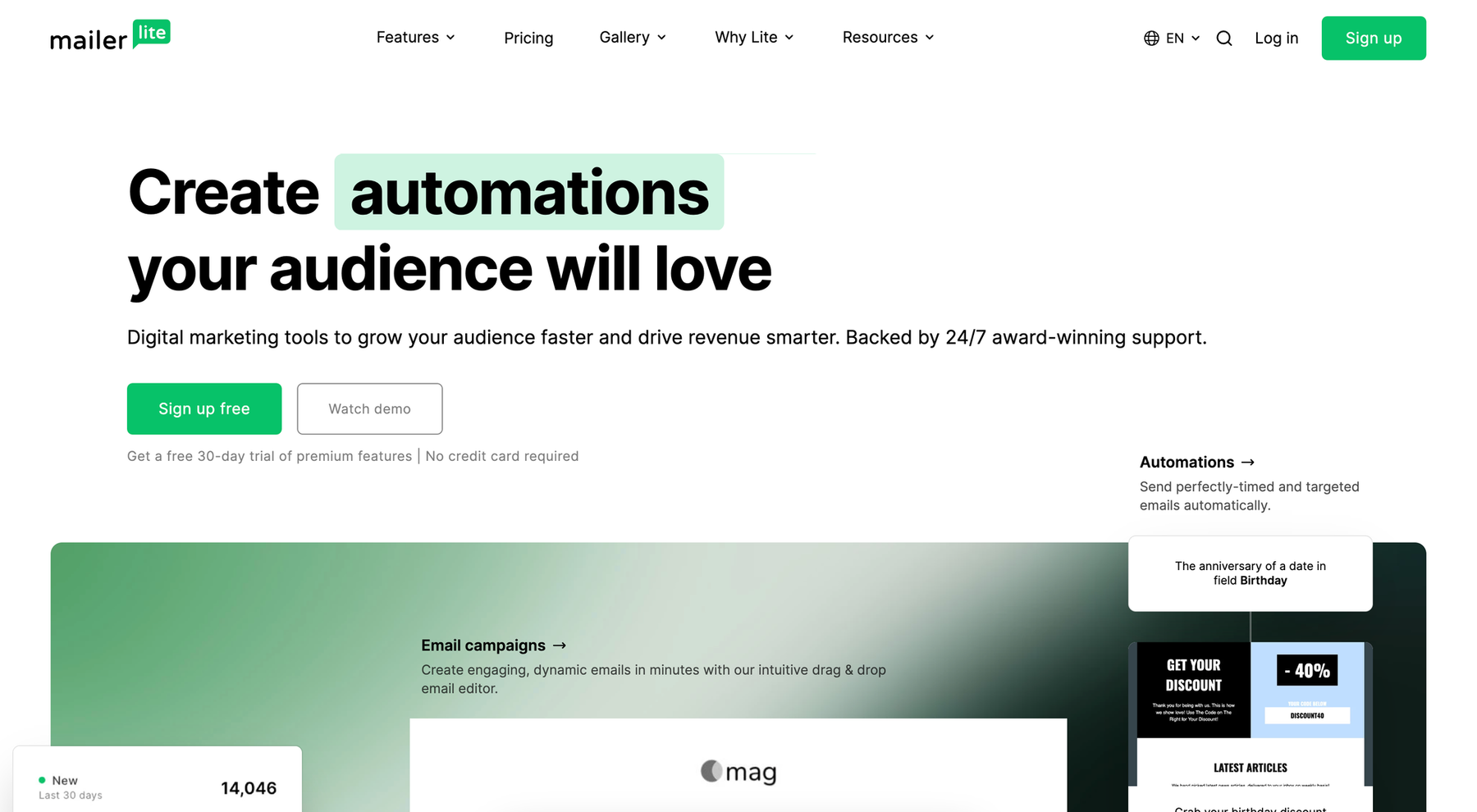
MailerLite is a simple and user-friendly email marketing tool, perfect for small and medium-sized businesses.
It’s easy to use, allowing anyone to create and manage email campaigns without needing technical skills. You can design beautiful emails with its drag-and-drop editor and use ready-made templates to save time.
MailerLite also helps automate tasks like sending follow-up emails or welcoming new subscribers, making your work easier. With features like detailed reports, A/B testing, and customizable forms, you can improve your campaigns and connect better with your audience.
It works seamlessly with tools like Shopify and WooCommerce, making it a great choice for online stores. Plus, with its affordable pricing and a free plan, it’s ideal for businesses starting out or looking to save money.
Takeaways
Email is still one of the most important ways we stay connected, with over four billion people using it every day.
With a multitude of options available, selecting the ideal email provider ultimately depends on your personal preferences. While Gmail may be the preferred choice for many, the optimal choice depends on your specific needs, whether personal or business-related.
In the overview above, we looked at some of the top free email providers, highlighting their features and benefits. But what we recommend as the top pick may not be the perfect fit for you.
It's all about figuring out which provider offers the tools and features that best suit your specific goals and preferences in 2025.



